UGC Announces Admissions in Two Academic Session 1st Batch (July/August). 2nd Batch (January/February)
Admission Open for January 2025 batch.
Get a Degree by NAAC A++ Accredited Universities Globally Recognised Universities As per Govt.
#AapkiSuccessHamariPriority
UGC Announces Admissions in Two Academic Session 1st Batch (July/August). 2nd Batch (January/February)
Admission Open for January 2025 batch.
Get a Degree by NAAC A++ Accredited Universities Globally Recognised Universities As per Govt.
#AapkiSuccessHamariPriority
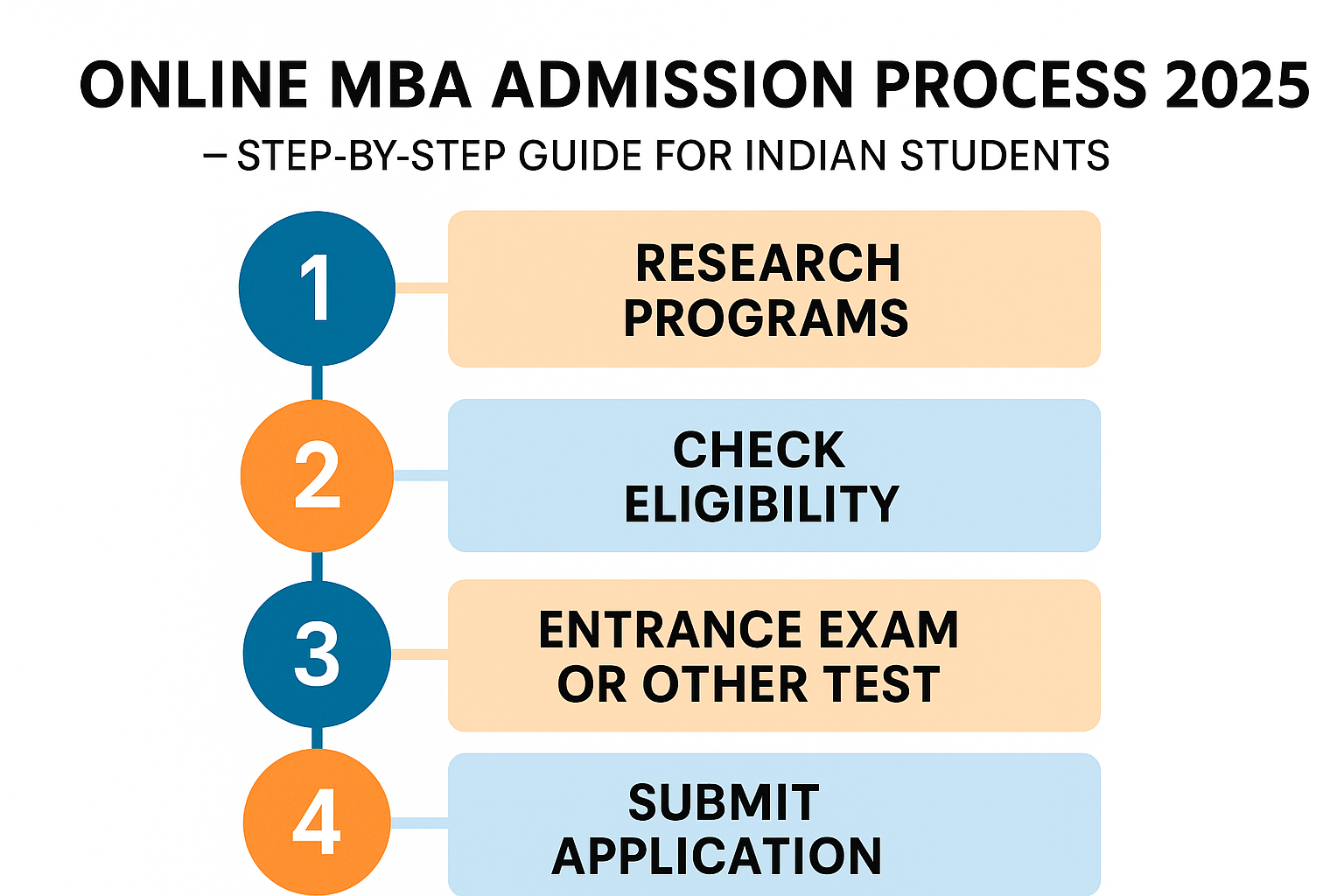
Online MBA Admission Process 2025 – Step-by-Step Guide for Indian Students
🎓 Start Your Online MBA Journey with Confidence — Everything You Need to Know Planning to pursue an Online MBA in 2025? Great choice! Whether you’re a working professional, entrepreneur, or recent graduate, an Online MBA offers you the flexibility to learn at your own pace—without quitting your job or attending physical classes. But here’s the catch: many students are confused about the online MBA admission process. What’s the eligibility? Are there entrance exams? How to apply? In this detailed guide, we’ll walk you through the entire admission process for Online MBA programs in India in 2025 — step by step. Have Questions? We’ve Got Answers – Enquire Now! Download Brochure for Online MBA Download Free Online MBA Guide ✅ Step 1: Choose a UGC-Approved Online MBA University Step 1: Choose a UGC-Approved Online MBA University Before applying, ensure the university is: UGC Entitled (Approved to offer online degrees) AICTE Approved (for technical validity) Preferably NAAC A or A++ Grade Popular UGC-Approved Online MBA Universities: NMIMS Global Jain University Amity University Online GLA University Online IGNOU DY Patil Online Step 2: Check Eligibility Criteria Most Online MBA programs have simple and accessible eligibility rules: Criteria Requirement Educational Qualification Bachelor’s Degree (any stream) Minimum Marks 45–50% (varies by university) Entrance Exam Usually not required Work Experience Not mandatory (preferred in some cases) No CAT, MAT, or GMAT is needed for most online MBA courses. Step 3: Select Your Specialization Choose a specialization that aligns with your career goals: Popular Online MBA Specializations Marketing Management Financial Management Human Resource Management Business Analytics International Business IT & Systems Management Operations Management Step 4: Prepare Your Application Each university has an online portal for application. Here’s what you’ll need: Documents Required: Scanned copy of 10th, 12th, and graduation mark sheets Passport-size photograph Aadhar Card / Government ID Resume (optional, for working professionals) Some universities may also require: Statement of Purpose (SOP) Proof of work experience (for Executive MBA) Step 5: Fill Online Application Form Visit the university’s website or apply through a trusted partner like EduGrad.in for assistance. Application Steps: Register on the official website Choose your program & specialization Upload required documents Pay application/registration fee (₹500–₹1000 typically) Submit and wait for confirmation Step 6: Pay the Program Fee Once your documents are verified and you receive admission confirmation, you’ll be required to pay the program fee. Fee Structure (Approximate): University Fee (2 years) NMIMS ₹1.68 Lakhs Jain ₹1.60 Lakhs Amity ₹1.79 Lakhs GLA ₹60,000 –₹70,000 IGNOU ₹62,000 EMI and loan facilities are available with many universities. Step 7: Get LMS Access and Start Learning After successful enrollment, you’ll get access to: Learning Management System (LMS) Study materials (PDFs, videos, eBooks) Live & recorded sessions Assignments and discussion forums Support from faculty and mentors You can now start your MBA journey from the comfort of your home! 🧠 FAQs on Online MBA Admissions 🎓 Online MBA Admission Calendar (2025) Intake Application Period January 2025 Oct 2024 – Jan 2025 July 2025 Mar 2025 – July 2025 Get a free counseling session for Online MBA Degree from NMIMS University Enquiry Now 🧠 FAQs on Online MBA Admissions ❓ Is Online MBA valid in India? Yes, if it’s from a UGC-approved and NAAC-accredited university. ❓ Can I pursue Online MBA while working full-time? Absolutely! That’s the biggest advantage. ❓ Are placements available? Yes, many universities offer career support, resume building, mock interviews, and job fairs. ❓ Can I pursue Online MBA from abroad? Yes, you can enroll in Indian online MBAs from anywhere in the world. 📞 Need Help With Your Application? EduGrad.in offers: ✅ Free career counseling ✅ University comparison ✅ Application assistance ✅ Scholarship guidance 🎯 Get expert help in choosing the right Online MBA program that matches your career goals. 👉 Contact us today or apply online at www.edugrad.in Inquiry FormPlease enable JavaScript in your browser to complete this form.Please enable JavaScript in your browser to complete this form.Name *Email *Mobile Number *Enter Your CitySelect Course *-Select Course-B.ScBABCAB.ComBBAMCAM.ScM.ComMBAMA Submit Top Universities Admission Open for 2025

Online MBA for Working Professionals – A Complete Guide
💼 Upgrade Your Career Without Leaving Your Job Are you a working professional aiming for a promotion, career switch, or leadership role — but don’t want to quit your job for an MBA? The solution is simple: Online MBA for Working Professionals. In 2025, top Indian universities are offering UGC-approved online MBA programs that are tailored for busy professionals. You can attend live or recorded classes, study at your pace, and gain a valid MBA degree from a top-ranked institution — all without taking a career break. Let’s explore how an Online MBA can transform your career and which programs are best for working professionals in India. Have Questions? We’ve Got Answers – Enquire Now! Download Brochure for Online MBA Download Free Online MBA Guide 🎯 Why an Online MBA is Ideal for Working Professionals An Online MBA gives you the best of both worlds—the credibility of an MBA and the flexibility to continue working. Key Benefits: No need to quit your job 100% online learning with weekend or self-paced lectures Learn while you earn Apply what you learn immediately at work Affordable compared to full-time MBA Opportunity to switch industries or functions Recognized by UGC and accepted globally 📚 Top Online MBA Programs for Working Professionals in India (UGC Approved) Here are the best universities offering flexible and credible Online MBAs for professionals: 1. NMIMS Global Online MBA UGC Entitled, NAAC A+ 10+ specializations: Marketing, Business Analytics, Finance, HR, etc. Flexible LMS + weekend sessions Fees: 2,10,000 Great for professionals in corporate roles 2. Jain University Online MBA UGC & AICTE Approved, NAAC A++ 20+ electives including Digital Marketing, Logistics, Data Science Live and recorded classes Fees: ₹1.6 Lakhs Industry certification options included 3. Amity Online MBA UGC and WES recognized, NAAC A+ Use of AI-based LMS, Harvard case studies Fees: ₹1.79 Lakhs Ideal for professionals seeking global exposure 4. GLA Online MBA UGC Entitled, NAAC A Specializations: Marketing, HR, IB, Operations Affordable: ₹60,000–₹70,000 Perfect for cost-conscious professionals 5. IGNOU Online MBA UGC & AICTE Approved Budget-friendly: ₹62,000 Flexible study material and online suppor Suitable for govt. job aspirants and mid-level managers 📈 Career Growth After Online MBA An online MBA can open doors to: Team leadership roles Managerial promotions Career switch (e.g., IT → Marketing or HR → Analytics) Entrepreneurship or startup management Global career opportunities 🔍 Online MBA Specializations for Professionals Choose a specialization that matches your current field or desired switch: Specialization Ideal For Marketing Sales, Branding, Digital Marketing Finance Banking, Investment, Accounting HRM HR Executives, Recruiters Business Analytics IT, Data, Operations International Business Export, Global Strategy Operations Manufacturing, Logistics 💡 Tips for Choosing the Right Online MBA UGC-Approved University Live + recorded classes flexibility Strong LMS (Learning Management System) Placement assistance or career services Reputation & industry relevance of the program Get a free counseling session for Online MBA Degree from NMIMS University Enquiry Now 🕒 Time Commitment – How Much Time Will You Need? Most Online MBAs are designed for professionals: 8–10 hours per week recommended Lectures on weekends or recorded 2 years duration (some offer fast-track or executive format) 💬 What Do Employers Think About Online MBAs? Thanks to UGC regulation, Online MBAs are now widely accepted in India. Recruiters value: Degree from a reputed university Practical knowledge & real-world application Continuous learning while working Major companies hiring online MBA grads: Accenture, TCS, Deloitte, HDFC, Cognizant, Infosys, ICICI, L&T Finance 🙋♂️ Who is Eligible for Online MBA? Bachelor’s degree from a recognized university (any stream) No entrance test required in most universities No work experience mandatory (but preferred by some) 🤝 Want Free Guidance? EduGrad Can Help You At EduGrad.in, we help working professionals: Choose the right Online MBA specialization Compare UGC-approved universities Get admission assistance with zero hassle Talk to our expert counselors or apply now via EduGrad.in Inquiry FormPlease enable JavaScript in your browser to complete this form.Please enable JavaScript in your browser to complete this form.Name *Email *Mobile Number *Enter Your CitySelect Course *-Select Course-B.ScBABCAB.ComBBAMCAM.ScM.ComMBAMA Submit Top Universities Admission Open for 2025

Top UGC Approved Online MBA Colleges in India – 2025 List
Study Smart with Government-Recognized MBA Degrees You Can Earn Online If you’re planning to pursue an Online MBA in India, the most important thing to check is whether the program is UGC approved. A UGC-entitled MBA means your degree is valid for jobs, promotions, higher studies, and government exams. To help you make an informed choice, we’ve listed the top UGC approved online MBA colleges in India for 2025, with details on specializations, fee structure, career support, and more. Have Questions? We’ve Got Answers—Enquire Now! Download Brochure for Online MBA Download Free Online MBA Guide 📘 What Does UGC Approval Mean for Online MBA? The University Grants Commission (UGC) is the statutory body that ensures quality and standards in higher education in India. In 2020, the UGC allowed recognized universities to offer Online Degree Programs under strict regulations. A UGC-approved Online MBA Colleges means: Your degree is 100% valid and recognized globally. Eligible for Govt. and private jobs, higher studies, or abroad opportunities. Assured quality, curriculum standards, and academic credibility. 🏆 List of Top UGC Approved Online MBA Colleges in India (2025) Here are India’s leading universities offering UGC-entitled Online MBA Colleges: 1. NMIMS Global (Narsee Monjee Institute of Management Studies) UGC Approval: Yes | NAAC Grade: A+ Specializations: Marketing, HR, Finance, Business Analytics, IT, and more Fees: ₹2,10,000 Approx. USP: One of India’s most popular online MBA brands with strong industry recognition Explore NMIMS Online MBA on EduGrad.in 2. Jain University Online UGC Approval: Yes | NAAC Grade: A++ Specializations: 20+ including Data Science, Digital Marketing, Finance Fees: ₹2,00,000 Approx. USP: Global add-on certifications, recorded & live sessions, excellent LMS 3. Amity University Online UGC Approval: Yes | NAAC Grade: A+ Specializations: 15+ including Entrepreneurship, HR, IB, and IT Fees: ₹1,99,000 Approx. USP: AI-powered learning platform, international recognition (WES approved) 4. GLA University Online UGC Approval: Yes | NAAC Grade: A Specializations: Marketing, HRM, International Business, Operations Fees: ₹90,000–₹97,000 Approx. USP: Affordable and industry-relevant curriculum, good for budget learners 5. IGNOU (Indira Gandhi National Open University) UGC + AICTE Approved Specializations: General Management Fees: ₹62,000 Approx. USP: Ideal for government job aspirants and affordable learning 6. DY Patil University Online UGC Approval: Yes | NAAC Grade: A++ Specializations: Marketing, Finance, HRM, IT Fees: ₹1,89,000 Approx. USP: One of the fastest-growing online universities in India Why Choose UGC Approved Online MBA Colleges? Your degree is 100% valid and credible Useful for government exams, PSU jobs, and higher studies Course quality is monitored by UGC Assures authenticity and value to employers Helps avoid fake or unrecognized degrees 📊 Online MBA Eligibility (General) A bachelor’s degree (any stream) from a recognized university Some universities may require minimum 50% marks No entrance test in most cases Work experience is not mandatory, but preferred for some programs Job Opportunities After UGC Approved Online MBA Colleges Get a free counseling session for Online MBA Degree from NMIMS University Enquiry Now 🤔 How to Verify If an MBA is UGC Approved? Graduates can pursue careers in: Business Development Digital Marketing Finance & Banking Data Analytics Project & Operations Management HR & Recruitment Top recruiters hiring Online MBA grads include: HDFC Bank, TCS, Wipro, Accenture, Deloitte, Capgemini, ICICI, Infosys Visit the official UGC-DEB portal: https://deb.ugc.ac.in/ Click on “Recognized HEIs (Online mode)” Search for your university in the list Always verify before enrolling 🙋 Need Help Choosing the Right UGC-Approved MBA? At EduGrad.in, we help students like you: Compare UGC Approved Online MBA Programs Get Free Counseling Apply to Top Universities hassle-free Contact us now or apply through EduGrad.in Inquiry FormPlease enable JavaScript in your browser to complete this form.Please enable JavaScript in your browser to complete this form.Name *Email *Mobile Number *Enter Your CitySelect Course *-Select Course-B.ScBABCAB.ComBBAMCAM.ScM.ComMBAMA Submit Top Universities Admission Open for 2025

Online MBA vs Regular MBA: Which One is Right for You in 2025?
Choosing Between Flexibility and Campus Life? Here’s a Complete Comparison If you’re planning to pursue an MBA in 2025, you’re likely facing the question: Should I go for a regular MBA or choose an online MBA? With the rise of digital education, many top universities are now offering UGC-approved online MBA programs that promise flexibility and affordability without compromising on academic value. In this blog, we’ll help you understand the key differences between Online MBA vs Regular MBA, so you can make the best decision for your career. Have Questions? We’ve Got Answers—Enquire Now! Download Brochure for Online MBA Download Free Online MBA Guide 📌 What is a Regular MBA? A regular MBA (also known as a full-time MBA) is a 2-year classroom-based program. You attend physical classes, participate in group projects, internships, and have a traditional college experience. Key Features: Full-time, campus-based Fixed schedule and attendance Networking with peers and faculty Campus placement opportunities 💻 What is an Online MBA? An Online MBA is also a 2-year postgraduate degree but delivered via digital platforms. You learn through live and recorded lectures, access study material online, and appear for online assessments. Key Features: 100% online learning Flexible schedule, ideal for working professionals UGC-approved & industry-relevant Lower fees than regular MBA 🆚 Online MBA vs Regular MBA – Detailed Comparison Factor Online MBA Regular MBA Learning Mode Virtual (live/recorded) Physical classroom Flexibility High – study anytime Low – fixed schedule Cost ₹50,000–₹2,00,000 ₹6–25 Lakhs (varies) Networking Limited (online events) Strong (campus interaction) Internships Optional or self-arranged Usually mandatory Placement Support Limited but growing Strong campus placements Best For Working professionals Fresh graduates, career switchers 💼 Who Should Choose an Online MBA? Working professionals who can’t leave their jobs Entrepreneurs or business owners Homemakers or parents returning to education People in remote areas without access to top colleges Those looking for affordable education with good ROI Who Should Choose a Regular MBA? Fresh graduates with little work experience Those who want an immersive campus experience Candidates who want structured placements Students aiming for top-tier B-schools like IIMs, XLRI, etc. 💡 Is Online MBA Recognized in India? Yes! As of 2024, many online MBA programs in India are UGC entitled, AICTE approved, and offered by NAAC A+ universities. Examples include: NMIMS Online MBA Jain University Online MBA GLA Online MBA Amity Online MBA IGNOU Online MBA Employers increasingly accept online MBAs, especially if the degree is from a reputed university. Online MBA vs Regular MBA – Cost Breakdown Type Approx. Cost (2 years) NMIMS Online MBA ₹1.6–1.8 Lakhs GLA Online MBA ₹60,000–₹70,000 IIM Regular MBA ₹18–25 Lakhs Tier 2 Private MBA ₹5–12 Lakhs Online MBAs offer better ROI for mid-career professionals who don’t want to take a break or a student loan. Get a free counseling session for Online MBA Degree NMIMS University Enquiry Now 📈 Career Scope & Jobs Online MBA graduates can pursue careers in: Digital Marketing Finance & Accounting Human Resource Management Business Analytics Operations & Supply Chain IT Project Management Top recruiters include: TCS, Accenture, Wipro, Deloitte, HDFC, Tech Mahindra, and more. 🧠 Final Verdict: Which One Should You Choose? Choose an Online MBA if you: Are a working professional Want flexible, affordable education Don’t want to relocate or attend daily classes Choose a Regular MBA if you: Are a recent graduate Value campus life, internships, and full-time placements Aim for elite B-schools 🙋♂️ Still Confused? Let EduGrad Help You Decide At EduGrad.in, we help students and professionals choose the right Online MBA program from top UGC-approved universities. ✅ Personalized counseling ✅ University comparison ✅ Admission assistance 📞 Talk to our counselors now and make the right career move! Inquiry FormPlease enable JavaScript in your browser to complete this form.Please enable JavaScript in your browser to complete this form.Name *Email *Mobile Number *Enter Your CitySelect Course *-Select Course-B.ScBABCAB.ComBBAMCAM.ScM.ComMBAMA Submit Top Universities Admission Open for 2025
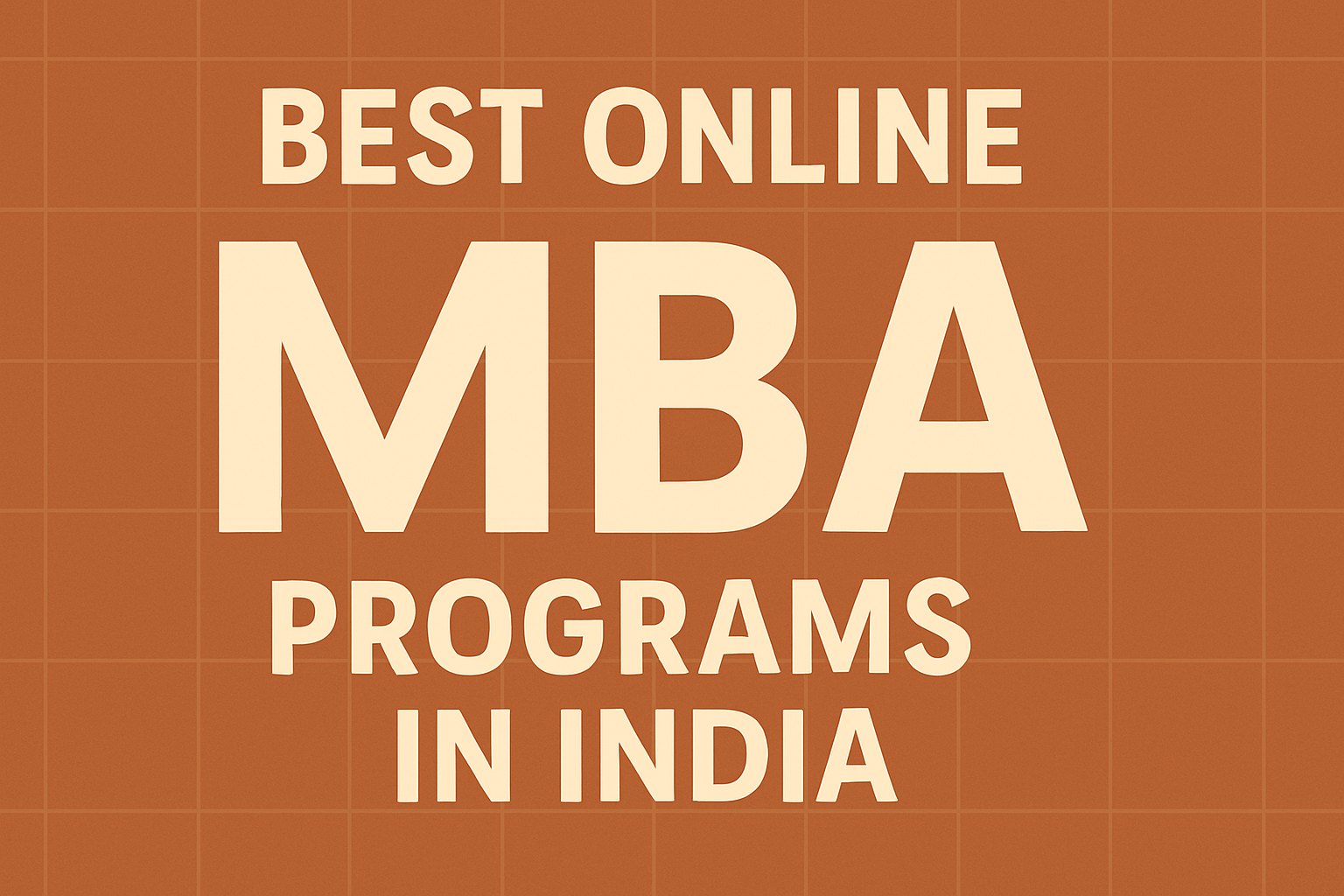
Best Online MBA Programs in India for 2025
In today’s fast-paced digital world, professionals are looking for flexible and affordable ways to upskill and accelerate their careers. One such powerful option is the Online MBA. With top universities now offering UGC-approved Online MBA Programs, students and working professionals can access quality education without leaving their jobs or relocating. In this blog, we bring you a curated list of the best Online MBA programs in India for 2025, comparing features, specializations, fees, and more — so you can make an informed decision. Have Questions? We’ve Got Answers—Enquire Now! Download Brochure for Online MBA Download Free Online MBA Guide ✅ What is an Online MBA? An Online MBA (Master of Business Administration) is a two-year postgraduate degree delivered through online platforms, offering flexibility, recorded/live lectures, and placement assistance — ideal for working professionals and distance learners. 📋 Top Online MBA Programs in India – 2025 1. NMIMS Global Online MBA University: Narsee Monjee Institute of Management Studies (NMIMS) Approval: UGC Entitled, NAAC A+ Duration: 2 years Specializations: Marketing, HR, Finance, Business Analytics, IT, and more Fees: ₹1,68,000 approx Why Choose NMIMS: Strong brand, industry-relevant curriculum, and placement support Learn more about NMIMS Online MBA here 2. Jain University Online MBA Approval: UGC + AICTE Approved, NAAC A++ Specializations: 20+ including Data Science, Finance, Strategy, and HR Fees: ₹1,60,000 approx Highlights: Global certification add-ons, LMS access, and industry mentoring 3. GLA University Online MBA Approval: UGC Approved, NAAC A Specializations: Marketing, HR, International Business, Banking Fees: ₹60,000–₹70,000 approx Ideal For: Budget-conscious students looking for a recognized degree 4. Amity Online MBA Approval: UGC Entitled, WES recognized Specializations: 15+ options including International Business, HRM, and Finance Fees: ₹1,79,000 approx USP: AI-powered LMS, Harvard case studies, live classes 5. IGNOU Online MBA Approval: UGC-DEB, AICTE Approved Specializations: General Management Fees: ₹62,000 approx Perfect For: Government job aspirants and those preferring public universities 🔍 How to Choose the Right Online MBA Program? Here are key factors to consider before enrolling: Factor Why It Matters UGC Approval Ensures your degree is valid for jobs and government exams Specializations Choose one that aligns with your career goals University Reputation Affects placements and credibility Placement Support Look for resume help, job fairs, and mentorship Fees Balance your budget and ROI expectations Get a free counseling session for Online MBA Degree NMIMS University Enquiry Now 💼 Career Opportunities After Online MBA Online MBA graduates can work in: Digital Marketing Human Resource Management Financial Analysis Business Development IT Management Operations & Supply Chain Companies hiring Online MBA grads include: TCS, Infosys, Wipro, Accenture, Deloitte, Amazon, HDFC, HCL, and more. Why Online MBA is the Future Learn from anywhere, anytime Access to top faculty and industry experts Affordable compared to full-time MBA Career switching made easier Get promoted without pausing your job 📌 Conclusion Whether you’re a working professional, fresh graduate, or entrepreneur, an Online MBA in India in 2025 is one of the most powerful investments you can make in your career. Choose the right program that fits your needs and goals. Still confused? Talk to our expert counselors at EduGrad.in for free guidance and university comparisons. Inquiry FormPlease enable JavaScript in your browser to complete this form.Please enable JavaScript in your browser to complete this form.Name *Email *Mobile Number *Enter Your CitySelect Course *-Select Course-B.ScBABCAB.ComBBAMCAM.ScM.ComMBAMA Submit Top Universities Admission Open for 2025
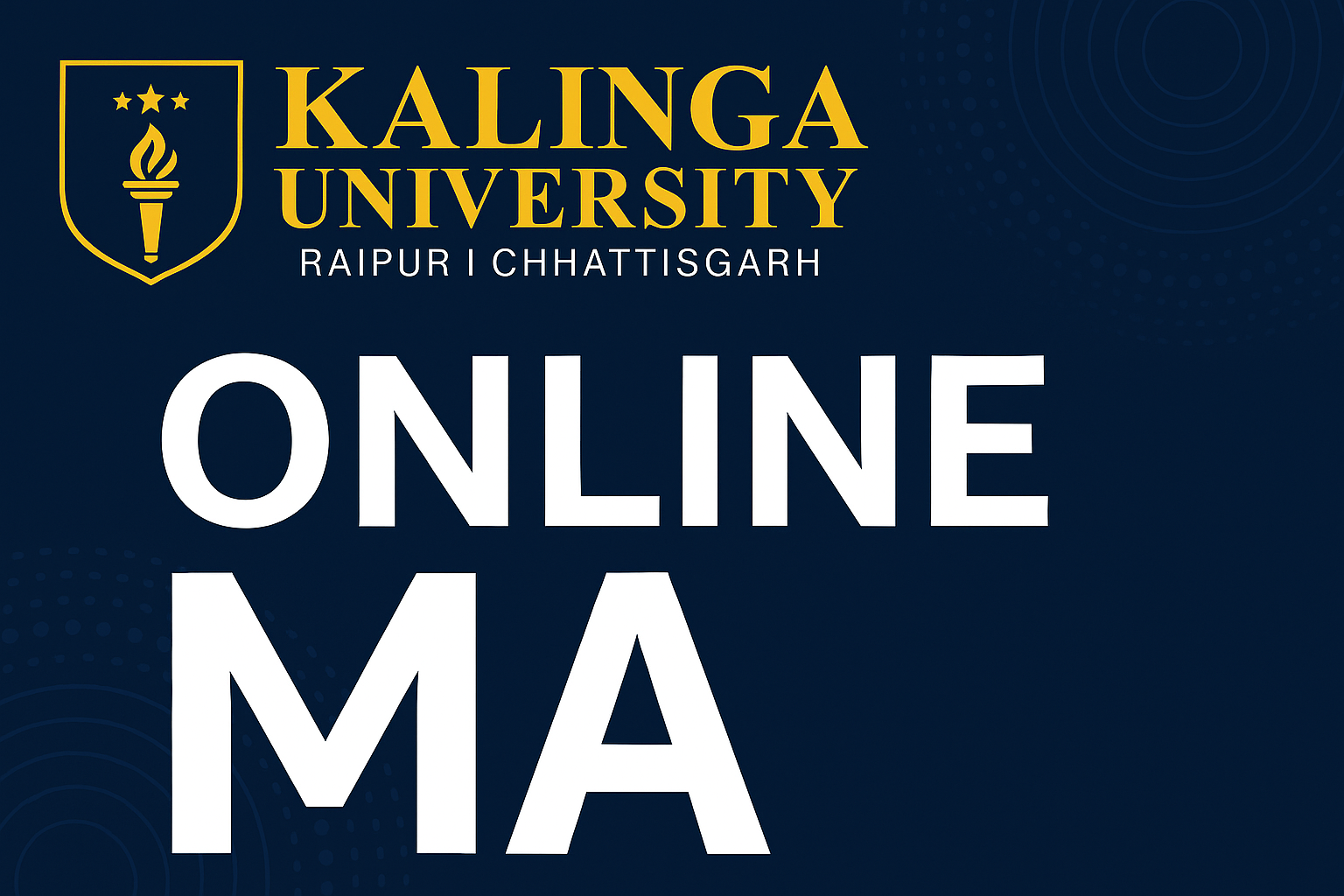
Online MA Kalinga University – Master of Arts Degree Program
Have you thought of enrolling in an Online MA Kalinga University? Having adopted the University Grants Commission of India standards for distance education accredited programs and following the international teaching standards, Kalinga University offers a rich and diverse program accompanied by the development of analysis, research, and work in the selected sphere. If you are interested in career progression or building the depth of knowledge in one’s subject area, the Online MA at Kalinga University provides all the tools necessary in order to succeed on the job market while all the necessary processes are performed online. Everything that you need to know about Kalinga University’s Online MA program, including the advantages of studying for a master’s degree, the curriculum, and admission requirements are discussed in this article. Why Should You Join an Online MA Program at Kalinga University? The Online MA from Kalinga University is an exceptionally flexible and high quality post graduate program with the added benefit of distance learning. Affiliated to the UGC this course endows students with the theoretic as well as the analytic tools required to succeed in the area of their choice. Here’s why the Online MA at Kalinga University stands out: Easy Learning Process: It’s a web-based program, so the students can combine their learning process with other activities, like work or family obligations. Global Recognition: Online degrees offered by Kalinga University are well accepted in the market among various sectors of job. High-Standard Curriculum: The program offers coursework that is based on research findings hence, the student gets knowledge that is up to date. What Types of Focus Areas Are There in the Online MA Program? MA program at Kalinga University trance the following specializations of interest to different candidates and their needs. Some popular areas include: Political Science – Deals with political systems, theories, and politics of the international community. Sociology – Concentrates with social relations, patterned conduct and connection with various societies. Psychology – Explores actions and conduct of individuals, ways and means by which the human mind functions and psychological theories. Economics – Includes both macroeconomic and microeconomic concepts, as well as economic strategies applied. Every specialization aims to give students comprehensive knowledge of major concepts, and ensure that every graduate is ready to take complicated positions in education, research, and business. How Is the Program Structured and What Is the Duration of Online MA in Kalinga University? The Online MA offered at Kalinga University is designed bearing in mind full time students and those in employment hence no rigid pattern. Here is an outline of the program structure: Component Details Program Duration 2 years Mode of Learning Fully Online Coursework Research, theory, and practical applications Assessments Assignments, projects, and exams What Qualifications Do I Need To Fulfill Before Qualifying For An Online MA in Kalinga University? Kalinga University purposely set easy qualifying requirements so as to admit diverse students into the University. The basic requirements for the Online MA program include: Educational Qualification: A recognized university degree at the level of a Bachelor’s degree from a recognized university. Minimum Percentage: Commonly, passing average is considered essential, whereas the grade point average of 2.0 or equivalent to 50% on the undergraduate degree is considered mandatory, while the specific for a particular specialization may differ. Work Experience (Optional): However, internships are not compulsory for any of them, but some specific fields could be useful in adding practicality to theoretical analysis. Get a free counseling session for Online MBA Degree NMIMS University Enquiry Now What Is the Fee Structure for the Online MA Program? The cost structures that have been adopted for the Online MA Programme at Kalinga University are very friendly and competitive. Here’s a general breakdown: Fee Component Amount (INR) Tuition Fee Varies by specialization Registration Fee Approximately INR 1,000 Examination Fee Charged per semester Financial assistance such as scholarships may be offered to deserving learners with special needs such as learners with low economic status or excellent academic performance achievers. How to Apply for the Online MA at Kalinga University Kalinga University’s Online MA program Admission is quite easy to fill as its interface is very responsive. Here’s a step-by-step guide to help you get started: Visit the Official Website: Access the admissions page of the Kalinga University website. Create an Account: Any first time user to the site needs to complete a registration process and fill an application form. Upload Required Documents: As regards the documents they should have all required documents such as academic transcripts, ID proof and photographs. Submit the Application: On its completion, enclose the application together with the fee that may be charged. Entrance Examination (if applicable): Some specializations may need students to take an entrance examination test, and among those establishments, Kalinga Scholastic Entrance Examination may be considered. Admissions are usually completed on a first come first serve basis, therefore, the earlier the better for faster consideration. Inquiry FormPlease enable JavaScript in your browser to complete this form.Please enable JavaScript in your browser to complete this form.Name *Email *Mobile Number *Enter Your CitySelect Course *-Select Course-B.ScBABCAB.ComBBAMCAM.ScM.ComMBAMA Submit Top Universities Admission Open for 2025

Online BCom GLA University – UGC-Recognized Commerce Degree
Online BCom GLA University is a hub for the presentation of modern world education where students want to complete their commerce course through distance learning mode. NAAC accredited ‘A+’ grade and UGC recognized GLA University has swiftly established itself as one of the premier institutions offering online education with appropriate courses. This program is designed for candidates who need to combine education with work or other responsibilities, but does not detract from the level of education provided. Degree program that aims at offering students an understanding of the management of business. It is under GLA University’s online learning program, which is effective, credible, and encompasses industry curriculum. The goal of this course is to provide the students with a basic understanding of business administration, managerial leadership competencies, and analytic thinking with a view to preparing them for any managerial position in different sectors. Why Choose Online B.Com At GLA University? The GLA University’s Bachelor of Commerce program that is offered online is highly worthy to consider because of its vast curriculum which has been designed keeping in mind the industry experts. This flow is an ideal method of studying as it combines the theory with the actual world practices expected of the students. Controlling and financial management, marketing and economic accounting, taxation, and banking are core courses and other elective courses that meet the prevailing market demand. Among the interesting features of the program, one can distinguish the focus on employment and self-employment. The modules are tailored by career focus and the career services involve the crafting of resumes, interview simulations, and job searching advice. To its credit, GLA makes sure that students are prepared to face the real business world or to commence skills development endeavors once they complete their course. What Can You Expect from the Curriculum of GLA University? The online B.Com from GLA University Online provides an exclusive understanding of specialized fields comprising accounting, finance, taxation, and economics. The coursework successfully combines theoretical principles as well as practical knowledge, which is presented by highly qualified faculty members coming from different countries. Some of the core subjects include: Financial accounting and reporting is a key element of business administration and is mainly utilized by business analysts to gain insight into the organizations’ financial condition. Corporate Law and Governance Business Economics Direct and Indirect Taxation Financial Management Banking and Insurance Besides, the program is complemented by industry-focused certifications to equip students with up-to-date practical knowledge and tools in commerce. Students enjoy having real life projects and cases because they make the courses more practical by incorporating analysis skills that are business oriented. To whom is GLA University’s Online B.Com most beneficial? The online B.Com program is designed for students who want to learn the principles of commerce while at the same time being free to plan their time as they wish. It is particularly suited for: Working. Unlike most of the programs, the program does not require entrance exam Professionals: Working persons who are already in the job market and those who wish to update their studies without having to look for other jobs. Aspiring Entrepreneurs: Candidates who are interested in acquiring business knowledge and relevant skills and establishing their own businesses. Recent High School Graduates: Students who learn best online as compared to the traditional class settings for admission; anyone who completes his schooling from a recognized board is welcome for admission. What Career Pathway Is Open to Students upon Completion of the Program? The jobs available for online B.Com GLA University students include accounting jobs, banking jobs, jobs in financial services, taxation, and corporate lawyers, to name but a few. The curriculum covers all the courses necessary to give students the foundation they need to perform junior roles in organizations, or they can choose to further their education to a master’s level, such as an MBA or M.Com, or acquire certifications in financial or management fields. Besides academic education, other learner services that I incorporate in the university process involve independent coaching and searching for a job that will facilitate the move of the learners to their respective careers. For the same reason, the employment prospects of GLA are equally good since it provides the students with a good and strong alumni network for when they go and look for employment. Get a free counseling session for Online MBA Degree NMIMS University Enquiry Now What is the Admissions Process? The admission process for the online B.Com at GLA University is very systematic and is an online procedure. The online application enables aspiring students to apply through the Nvidia University student portal, complete the compulsory online form, and upload other documents, including transcripts and identification cards. One of the advantages of the program is that there is no entrance examination for this program; hence, most students can undertake it. This means that applicants are subjected to academic qualification assessment. Initially, the tuition fee of the program is also reasonable and varies from INR 64,000 to INR 97,000, considering the program structure and the extra services such as industry certifications. Easy payment machinization is offered, and the fees can be paid on a per-semester basis. In this modern world, when students look forward to having a flexible and industry oriented commerce education, Online B.Com GLA University is the best option for them. From the foregoing discussion, it has been ascertained that the NAAC accredited GLA University has all the resources to deliver an academic and professional program in commerce that is satisfactory enough for the students to develop a successful career in the field. High career outcomes, experience, and networking make graduates of this program ready for jobs or higher education. Inquiry FormPlease enable JavaScript in your browser to complete this form.Please enable JavaScript in your browser to complete this form.Name *Email *Mobile Number *Enter Your CitySelect Course *-Select Course-B.ScBABCAB.ComBBAMCAM.ScM.ComMBAMA Submit Top Universities Admission Open for 2025

Online BBA from GLA University – UGC-Approved Degree Program
The Online BBA GLA University is an undergraduate degree program that aims at offering students an understanding of the management of business. It is under GLA University’s online learning program, which is effective, credible, and encompasses industry curriculum. The goal of this course is to provide the students with a basic understanding of business administration, managerial leadership competencies, and analytic thinking with a view to preparing them for any managerial position in different sectors. Why is GLA University’s Online BBA program special? The course offered at GLA University has an online mode BBA program that is approved by the UGC and accredited by NAAC with ‘A+’ grade for its sound academic credentials. The program is developed by professionals in the field as well as educators who apply the best theories in the field together with examples. It also covers recent developments in the business environment including digital marketing, e-commerce and data analysis, and is therefore quite relevant for today’s business environment. The online BBA curriculum covers various business disciplines, including: Marketing Sales Management Financial Management Human Resource Management Operation and Supply Chain Management Startups and Innovation Distinctive in this program is the availability of the choice of concentration in focused areas of business, enabling the students to fit the program to suit their career interests. The learning content is in electronic format along with e-books, virtual lectures and consoling, allowing the students to achieve class material and learning at their convenience. What Knowledge And Skills Does The Curriculum Bring? That is why the Online BBA at GLA University is established to provide a solid foundation of business concepts along with the ability to specialize if/as when needed. Some core subjects in the curriculum include Principles of Management This first module familiarizes the students with the key management concepts in planning, organizing, and controlling business activities. Business Economics The students find out the utility of economic theories in the formulation of business strategies and understanding the markets. Financial Accounting Fundamentals of accounting are important in the management of financial operations of a business and this subject assists the students to acquire this kind of knowledge. Business Law To show students the legal framework in managing organizations, information on contracts and legal requirements is provided. Human Resource Management This greatly emphasizes organizational human resource management, which deals with personnel management in an organization, and issues such as staffing, training, and personnel relationships fall under this management. Digital Marketing Since there is an explosion of online-based businesses, students are also trained how to effectively promote products and services online. For whom is GLA University’s Online BBA Suitable for? The online BBA program provides a perfect solution to anyone who plans a career in business management yet requires an adequate degree of schedule freedom. It is particularly suited for: Working Professionals: For those learners who are already working but interested in career progression from junior positions to managerial positions, the online BBA can be of great advantage. Entrepreneurs: It is a great resource for would-be entrepreneurs to learn more about how they can run their companies and further improve their understanding of business. Recent High School Graduates: The program means that young students can start their education at a certain level while continuing their education at a higher level, thus participating in other activities such as working. This program aims to produce students who can fill managerial capacities in different firms, especially in marketing, finance, human resources, and operations. What Is the Role of GLA University in Career Development? It is also essential to know that GLA University has been very focused on career concentration. Students enrolled in the Online BBA program have access to personalized career services that include Resume Building: In the past, I received professional assistance in the process of developing a resume that would match specific markets. Mock Interviews: Mock interviews for individuals forward in order to enhance the students’ performance during interviews by some employers. Job Search Support: Qualified and experienced job search consultants help students in searching for appropriate jobs of their choice in the preferred fields. Also, the program provides diverse networking contacts as well as alumni networks that may prove useful when the students are out in the employment market. Get a free counseling session for Online MBA Degree NMIMS University Enquiry Now Admission Procedure and Requirement Admission process of Online BBA GLA University is simple. It’s their opportunity to apply online through their university portal. Applicants should have their higher secondary education (10+2) qualification from a recognised board of education system. And the student community does not have to undertake entrance tests thus increasing chances for many to be admitted into the institution. The costs associated with the online BBA program are affordable, students are free to pay in installments. Conclusion The online BBA of GLA University provides a comprehensive business curriculum with the features of flexibility and academic challenge. Having curriculum developers with professionals in the industry and therefore career advancement through the support services that GLA University can offer, this program is suitable for management career aspirants, business and economic entrepreneurs, and other professionals desiring promotion up the management ladder. For high school graduates or working professionals, the GLA University’s Online BBA offers the skills, experience, and openness to succeed in the business environment of the modern world. Inquiry FormPlease enable JavaScript in your browser to complete this form.Please enable JavaScript in your browser to complete this form.Name *Email *Mobile Number *Enter Your CitySelect Course *-Select Course-B.ScBABCAB.ComBBAMCAM.ScM.ComMBAMA Submit Top Universities Admission Open for 2025

IGNOU Admission Guide 2025
India’s educational landscape has undergone a remarkable transformation in recent years. Among its pioneers of distance and open learning stands the Indira Gandhi National Open University (IGNOU), established in 1985 to democratize higher education. If you’re considering flexible, cost-effective, and recognized programs—ranging from certificates to doctoral degrees—this guide will walk you through every facet of the IGNOU admission guide for 2025. 1. Why Choose IGNOU? Flexibility & Accessibility: Study at your own pace, from anywhere in India (or abroad), via online learning materials and occasional regional centre workshops. Wide Range of Programs: Over 200 programs across disciplines—arts, science, management, education, engineering, and more. Recognition: Accredited by the University Grants Commission (UGC) and recognized by industries, government bodies, and academic institutions worldwide. “IGNOU bridges the gap between ambition and opportunity—no matter where you live or how busy your schedule is.” 2. IGNOU Programmes & Eligibility 2.1 Certificate & Diploma Courses Duration: 6 months to 1 year Eligibility: 10+2 or equivalent for most certificates; graduation for certain diploma programmes 2.2 Undergraduate Degrees B.A., B.Sc., B.Com, BCA, B.Ed., BSW Eligibility: 10+2 from a recognized board; subject-specific requirements may apply 2.3 Postgraduate Degrees M.A., M.Sc., M.Com, MBA, MCA, M.Ed., PG Diploma Eligibility: Graduation in a relevant discipline with minimum aggregate marks (varies by programme) 2.4 Research Programmes (MPhil & PhD) Eligibility: Postgraduate degree with at least 55% aggregate; entrance test/interview conducted by IGNOU 3. Key Highlights & Important Dates (2025 Admissions) Event Date (Tentative) Online Application Portal Opens 1st May 2025 Last Date to Apply (Without Late Fee) 30th June 2025 Last Date to Apply (With Late Fee) 31st July 2025 Issue of Admit Cards (Entrance Exams) August 2025 Term–End Exams January & July (twice a year) Program Mode December 2025 – January 2026 Affiliation December 2025 – January 2026 4. Step-by-Step IGNOU Online Admission Process Register as a New User Provide a valid email ID and phone number. Verify OTPs sent to both channels. Fill the Application Form.Personal Details: Name, date of birth, address, nationality.Educational Qualifications: Roll numbers, board/university, subjects, percentages.Program Selection: Choose your desired program code and regional center. Upload Documents Passport-size photograph (JPEG, 10–50 KB) Signature (JPEG, 10–50 KB) Scanned certificates/mark sheets (PDF, 100–300 KB each) Pay the application fee.Certificate: ₹200–300Diploma: ₹500–600Undergraduate: ₹500–1,000Postgraduate: ₹1,000–2,000Payment modes: debit/credit card, net banking, UPI, or Paytm. Review & Submit Double-check all entries. Once submitted, note down the “Enrollment Number” and print the confirmation page for future reference. 5. Documents Checklist Document Format & Size Format & Size Class 10 Mark Sheet PDF (100–300 KB) Proof of date of birth Class 12 Mark Sheet PDF (100–300 KB) Required for UG admission Graduation Mark Sheet (for PG/PG Diploma) PDF (100–300 KB) Required for UG admission Graduation Mark Sheet (for PG/PG Diploma) PDF (100–300 KB) Caste/Category Certificate (if applicable) PDF (100–300 KB) SC/ST/OBC/EWS certificates PwD Certificate (if applicable) PDF (100–300 KB) Persons with disability Passport-size Photograph JPEG (10–50 KB)-size PhotograpJPEG (10–50 KB)h Recent, on white background Signature JPEG (10–50 KB) Your own legible signature 6. Understanding the Fee Structure IGNOU’s “pay-per-course” model allows you to manage expenses effectively: Certificate Courses: ₹400 – 800 per course Diploma Courses: ₹800 – 1,600 per course Undergraduate Degrees: ₹1,000 – 2,500 per course Postgraduate Degrees: ₹2,000 – 3,500 per course PhD / Research: ₹3,000 – 5,000 per course Note: These fees exclude examination and study material charges, which vary by programme. 7. Tips to Ensure a Smooth Admission Early Preparation: Gather and scan all documents at least two weeks before applications open. Stable Internet: Use a reliable connection when filling and submitting forms to prevent session time-outs. Accurate Data Entry: Typos in your name, date of birth, or programme code can lead to complications—double-check everything! Payment Proof: Save transaction screenshots or UPI receipts until your admission is confirmed. Stay Updated: Join IGNOU regional centre WhatsApp groups or follow official social media handles for real-time updates. 8. Scholarships & Financial Aid IGNOU facilitates various scholarships to support meritorious and economically weaker students: National Scholarship: For SC/ST candidates based on state government norms. IGNOU Merit Scholarships: Awarded to top performers in earlier terms of PG programmes. State Government Scholarships: Several states offer fee reimbursement or scholarships for eligible students. Contact your regional centre’s Student Support Services for scholarship application forms and deadlines. Get a free counseling session for Online MBA Degree NMIMS University Enquiry Now 10. Conclusion Embarking on your IGNOU journey is a transformative decision toward achieving academic and professional milestones on your own terms. By following this detailed IGNOU admission guide, you can navigate each step—eligibility checks, document uploads, fee payments—with confidence. Remember to adhere to deadlines, verify all information, and leverage available resources such as counselling at your regional centre. Your flexible pathway to success awaits—ignite your aspirations with IGNOU in 2025! Frequently Asked Questions (FAQs) 1. What is the minimum qualification for IGNOU admission? For certificate courses: 10+2 or equivalent. For diploma/UG courses: 10+2. For PG programmes: a relevant bachelor’s degree. 2. Can I apply for more than one programme in a single application? Yes. IGNOU allows multiple programme selections in one application form; applicable fees must be paid for each. 3. Is IGNOU degree valid for government jobs and higher studies? Absolutely. IGNOU is UGC-recognized, and its degrees are valid for all government and private sector recruitments. 4. How long does IGNOU admission confirmation take? Typically 7–10 working days after fee payment and document verification. You will receive an official confirmation email and SMS. 5.Can I cancel my IGNOU admission after submitting the form? Cancellations are possible within 15 days of admission, subject to partial fee refund as per university norms. Contact the regional centre for details. 6. How do I track my IGNOU application status? Log in to the “Online Admission” portal with your enrollment ID and password. The status page updates in real time. Inquiry FormPlease enable JavaScript in your browser to complete this form.Please enable JavaScript in your browser to complete this form.Name *Email *Mobile Number *Enter Your CitySelect Course *-Select Course-B.ScBABCAB.ComBBAMCAM.ScM.ComMBAMA Submit Top

Distance BBA from IGNOU
In today’s fast-moving world, the demand for flexible and affordable education is growing rapidly. If you’re looking to earn a Bachelor of Business Administration (BBA) without compromising your personal or professional commitments, the Distance BBA from IGNOU (Indira Gandhi National Open University) could be the perfect solution. With over 4 million active learners, IGNOU is India’s largest and most trusted open university, offering UGC-approved degrees recognized in both government and private sectors. Their distance BBA program is specially designed for students who want to kickstart a career in business, management, or entrepreneurship — all from the comfort of their home. Let’s dive into the details of this highly sought-after program. 📚 What is BBA in Distance Mode? A Bachelor of Business Administration (BBA) in distance mode is a 3-year undergraduate degree that provides foundational knowledge in business management, marketing, finance, and entrepreneurship. It is ideal for: 1. Class 12th pass-outs 2. Working professionals aiming for promotions 3. Aspiring entrepreneurs and business owners 4. Students preparing for MBA or higher education The best part? You don’t have to attend daily college or relocate. All learning materials, assignments, and exams can be accessed remotely. 🏛️ About IGNOU – India’s Leader in Distance Education IGNOU (Indira Gandhi National Open University) is a Central University established by an Act of Parliament in 1985. It is recognized by: 1. UGC (University Grants Commission) 2. AICTE 3. NAAC (Accredited A++) 4. Ministry of Education, Government of India With over 35+ years of experience, IGNOU offers more than 200 programs in distance and online mode, including BBA, MBA, BA, MA, MCA, and diplomas. 🎓 IGNOU Distance BBA Program Overview Feature Details Course Name Bachelor of Business Administration (BBA – Services Management) Duration 3 years (can be extended up to 6 years) Eligibility 10+2 or equivalent from a recognized board Medium of Instruction English Admission Cycle January & July (twice a year) Program Mode Distance Learning with online support Affiliation UGC + IGNOU (Central Govt. university) Specialization Services Management (in collaboration with MKCL) 📋 Eligibility Criteria To apply for IGNOU’s Distance BBA: 1. You must have passed 10+2 (Class XII) or equivalent. 2. There is no entrance test. 3. No age limit for enrollment. Both freshers and working professionals are eligible. 💸 Course Fees Component Fee Total Program Fee ₹30,000 (approx) Per Year ₹10,000 (may vary by semester/region) Registration Fee ₹300 (one-time) 💡 Note: The fee may vary slightly for international or SAARC students. IGNOU also offers fee waivers for reserved categories in select cases. 📦 Course Structure & Subjects The BBA Services Management program covers a mix of theoretical and practical subjects, focusing on real-world applications. Some key subjects include: 1. Business Organization 2. Principles of Management 3. Business Communication 4. Financial Accounting 5. Marketing Management 6. Human Resource Management 7. Service Operations 8. Customer Relationship Management 9. Business Ethics 10. Project Work Each semester includes assignments, term-end exams, and sometimes industry exposure (via internships or virtual sessions). Get a free counseling session for Online MBA Degree NMIMS University Enquiry Now 📈 Career Scope After Distance BBA from IGNOU A Distance BBA from IGNOU opens the door to multiple career opportunities across sectors. Graduates can pursue roles in: Marketing & Sales Human Resource (HR) Finance & Accounts Operations Management Business Development Entrepreneurship or Startup Further Studies (like MBA, PGDM, etc.) Many IGNOU BBA graduates go on to pursue MBA from top institutions or enter prestigious government jobs. 🧠 Benefits of Studying BBA from IGNOU in Distance Mode ✅ Flexibility Study at your own pace without disrupting your job, business, or other commitments. ✅ Affordability IGNOU offers one of the lowest fee structures for a recognized BBA degree in India. ✅ UGC-Approved & Valid Globally The degree is accepted for government jobs, private sector roles, and international admissions. ✅ Nationwide Support IGNOU has regional centers, study centers, and online platforms to support learners across India. ✅ Skill-Oriented Curriculum The curriculum is job-ready and practical, with a focus on services management — one of the fastest-growing sectors in India. 🌐 How to Apply? IGNOU admissions are open twice a year—in January and July sessions. Steps to Apply: Visit: https://edugrad.in Register yourself with basic details. Fill in academic and personal information. Upload required documents (10+2 marksheet, photo, signature, ID proof). Pay the application fee and submit the form. Once admitted, you’ll receive a student ID and access to study materials through the edugrad.in portal. 📖 Learning Support & Exams Study Material: Printed books + e-books via edugrad.in Assignments: Mandatory for each subject, carry weight in final marks Term-End Exams (TEE): Conducted in June and December Project Work: Final year project to demonstrate understanding of core concepts Students also get access to virtual lectures, doubt-solving forums, and academic counselors through regional centers. 🧾 Recognition & Validity The BBA degree from IGNOU is valid for: 📄 UPSC, SSC, and other Government Exams 🎓 Postgraduate programs like MBA, PGDM, M.Com 🌍 Jobs in India and abroad 🏢 Corporate sector hiring (HR, Sales, Finance) IGNOU is a UGC-recognized Central University, so your degree holds value across all sectors. You may be wondering: “Are these rankings really helpful?” The answer is a strong yes. Here’s why: Here are the top advantages: 🙋♂️ Frequently Asked Questions (FAQs) Q1. Is BBA from IGNOU a valid degree? Yes. IGNOU is a UGC and AICTE-recognized university, and its BBA degree is valid across government and private sectors. Q2. Does IGNOU offer placement after BBA? While IGNOU doesn’t have traditional placement cells, many students use the degree to pursue MBA, appear in competitive exams, or get jobs through self-preparation. Q3. Is attendance mandatory in distance BBA? No daily attendance is required. However, attending online sessions and completing assignments is recommended for better understanding. Q4. Can I do MBA after IGNOU BBA? Absolutely! You can apply for MBA in India or abroad after completing BBA from IGNOU. Q5. How many years does IGNOU BBA take? The minimum duration is 3 years, and students can
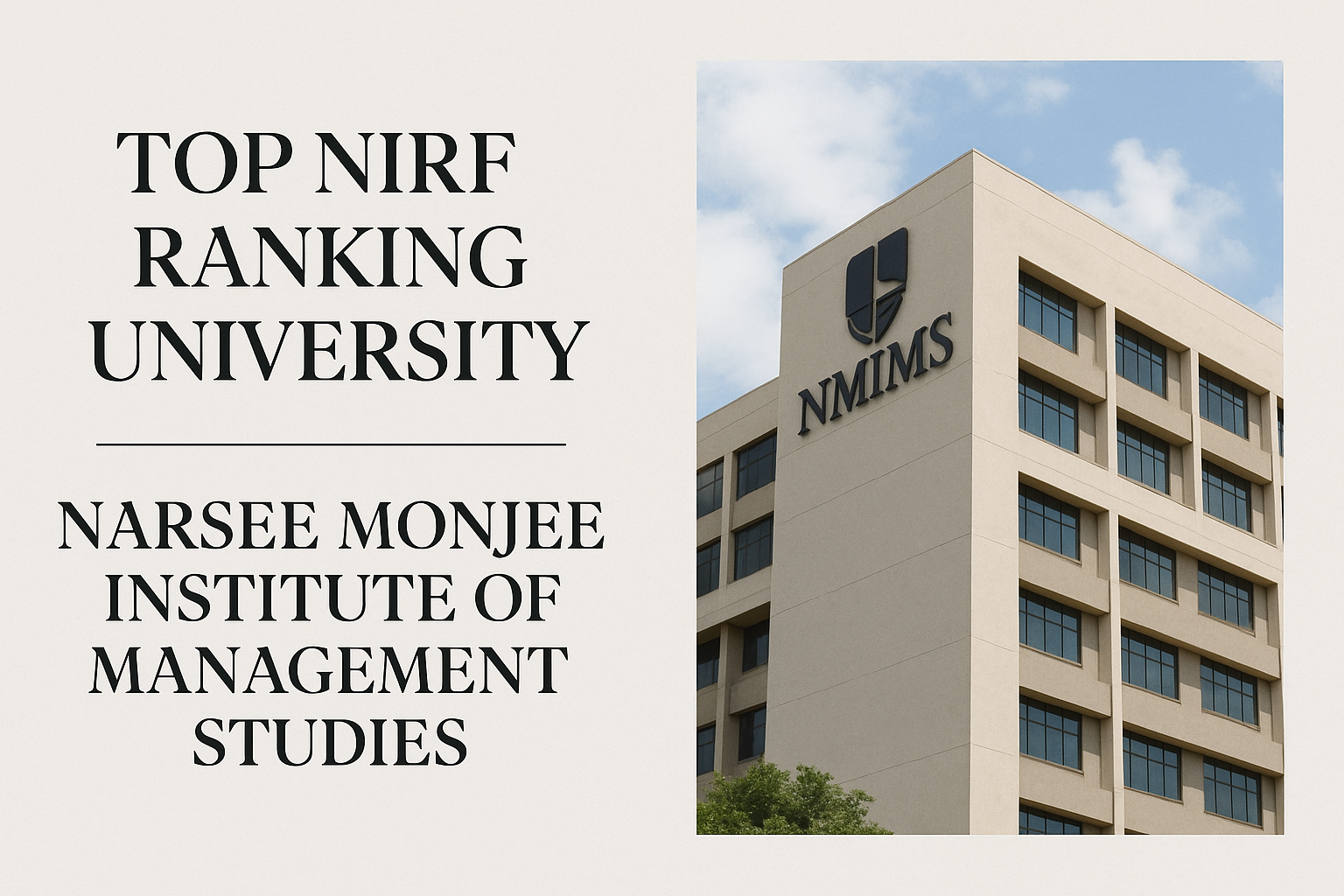
NIRF Ranked University List
Choosing the right university is one of the most important decisions in a student’s academic life. With thousands of institutions across India, how do you find the best? This is where the NIRF (National Institutional Ranking Framework) steps in as a trustworthy guide. Every year, the Ministry of Education, Government of India, releases the NIRF Ranked Universities List—an authoritative ranking that helps students, parents, and educational institutions gauge performance and quality. The NIRF 2025 rankings are out, and they provide valuable insights into the top universities in India across categories like teaching, research, employability, inclusivity, and public perception. Whether you’re an aspiring engineer, doctor, lawyer, or future entrepreneur, these rankings offer a reliable starting point to map your academic journey. What is NIRF? Launched in 2015, the National Institutional Ranking Framework (NIRF) was created by the Ministry of Education to rank higher educational institutions in India. Unlike traditional rankings based only on reputation or student population, NIRF evaluates institutions using quantifiable data under clearly defined parameters. Its aim is to promote excellence and transparency in Indian higher education. Parameters Used in NIRF Ranking Here’s how the NIRF ranking works. It uses five major parameters, each with a defined weight: Criteria Weightage Teaching, Learning & Resources (TLR) 30% Research and Professional Practice (RP) 30% Graduation Outcomes (GO) 20% Outreach and Inclusivity (OI) 10% Perception (PR) 10% This approach ensures that universities are assessed fairly, focusing not just on infrastructure or history but also on outcomes, diversity, and innovation. Top 10 Universities in India: NIRF Ranked Universities 2025 Let’s take a look at the universities that have earned the top ranks this year: Rank University Name Location 1 Indian Institute of Science (IISc) Bengaluru, Karnataka 2 Jawaharlal Nehru University (JNU) New Delhi 3 Banaras Hindu University (BHU) Varanasi, UP 4 University of Hyderabad New Delhi 5 Jamia Millia Islamia New Delhi 6 Jadavpur University Kolkata, West Bengal 7 Amrita Vishwa Vidyapeetham Coimbatore, Tamil Nadu 8 Manipal Academy of Higher Education Manipal, Karnataka 9 Savitribai Phule Pune University Pune, Maharashtra 10 Aligarh Muslim University (AMU) Aligarh, UP These institutions consistently excel in teaching, research, graduation outcomes, and diversity, making them top choices for students across India and even abroad. Top Universities by Category NIRF doesn’t just rank universities overall—it provides category-wise rankings for specialized fields. Here’s a quick breakdown: 🏗️ Engineering Rank Institute Location 1 IIT Madras Chennai 2 IIT Delhi New Delhi 3 IIT Bombay Mumbai 💼 Management Rank Institute Location 1 IIM Ahmedabad Gujarat 2 IIM Bangalore Karnataka 3 IIM Kozhikode Kerala ⚖️ Law Rank Institute Location 1 National Law School of India University (NLSIU) Bengaluru 2 National Law University (NLU) New Delhi 3 NALSAR University of Law Hyderabad ⚕️ Medical Rank Institute Location 1 AIIMS Delhi New Delhi 2 PGIMER Chandigarh 3 CMC Vellore Tamil Nadu Why Students Should Care About NIRF Rankings You may be wondering: “Are these rankings really helpful?” The answer is a strong yes. Here’s why: ✅ Better Academic Environment Top-ranked institutions often have better infrastructure, experienced faculty, and well-structured curricula. 💼 Higher Employability Graduates from highly ranked universities tend to attract better job offers due to their reputation and industry collaborations. 🌐 Global Recognition Many international organizations refer to NIRF when evaluating Indian degrees for further education or work permits. 📚 Research & Innovation Opportunities If you’re interested in pursuing a PhD or contributing to research, these institutions offer strong support systems. 🧠 Smart Decision-Making Rankings help narrow down your college list based on your course preferences, location, and academic priorities. How to Use NIRF Rankings for Admissions Using the NIRF Ranked University List smartly can save time and effort. Here’s a step-by-step guide: 1. Identify Your Interest Area: Start by deciding whether you want to pursue Engineering, Management, Arts, or a niche course. 2. Refer to Category-Wise Rankings: Look at NIRF rankings in that category (e.g., Management or Law). 3. Evaluate Factors Beyond Rank: Consider fee structure, campus life, placements, and online/offline mode of learning. 4. Visit Official Websites: Check if they are accepting applications and their admission criteria. 5. Check Accreditation: Ensure the university is UGC-approved or AICTE-recognized. Get a free counseling session for Online MBA Degree NMIMS University Enquiry Now Benefits of Studying in a NIRF Ranked Universities Here are the top advantages: Quality Education: Highly ranked institutions maintain teaching standards. Access to Experts: Renowned professors and visiting faculty. Better Infrastructure: Libraries, labs, tech-enabled classrooms. Industry Connections: Strong placement cells and alumni networks. Scholarships and Funding: Easier access to merit-based scholarships. Online Degrees & NIRF Rankings With the rise of digital learning, many NIRF-ranked universities now offer online and distance education programs. For example: Amrita Vishwa Vidyapeetham offers online MBA and BCA programs. Manipal University offers online BBA and M.Com degrees. Jamia Millia Islamia provides hybrid learning opportunities. If you are a working professional or need location flexibility, opting for a program from a NIRF-ranked online university can offer the best of both worlds—credibility + convenience. Frequently Asked Questions (FAQs) Q1. What is the purpose of NIRF rankings? NIRF rankings are designed to provide a transparent and reliable system to evaluate and rank higher education institutions in India based on performance and quality. Q2. Who releases the NIRF rankings? The Ministry of Education, Government of India, releases the rankings every year. Q3. Can private universities be part of NIRF? Yes, both public and private universities are eligible if they provide accurate data and meet the evaluation standards. Q4. Are online degrees from NIRF-ranked universities valid? Absolutely. If the university is UGC-approved and NIRF-ranked, their online programs are equally recognized and valid for jobs and further studies. Q5. How often are the rankings updated? NIRF rankings are updated annually, usually around June or July. Q6. Where can I access the official NIRF rankings? You can visit the official NIRF website: https://www.nirfindia.org Q7. Does a higher NIRF rank guarantee a better job? While a higher rank often reflects quality, employability also depends on your course, skillset, internships, and networking. Q8. Are colleges

UGC Allows Students to Pursue Two Degrees Simultaneously
In a bold move to revamp higher education in India, the University Grants Commission (UGC) has allowed students to pursue two degrees simultaneously. This new policy is aligned with the goals of the National Education Policy (NEP) 2020, aiming to provide flexibility and multi-disciplinarity in higher education. Whether you are a working professional looking to upskill or a student aspiring to explore two different academic fields, this reform could open doors to immense opportunities. But what does it really mean? How does it work? Let’s explore in detail. UGC’s Two Degree Policy: An Overview On April 12, 2022, UGC officially announced that students can enroll in two full-time academic programs at the same time, either in physical mode, online mode, or a mix of both. This regulation is designed to break the rigidity of traditional education systems and empower learners to pursue diverse academic interests. Key Highlights of the Policy 📘 Two Full-Time Degrees: Students can pursue two degrees at the same time from the same or different universities. 🌐 Multiple Modes Allowed: Both degrees can be in physical mode, one in physical and one in online, or both in online mode. 🏫 Recognized Institutions Only: The degrees must be offered by UGC-recognized institutions or those approved under statutory councils like AICTE, NCTE, or BCI. 🎓 No Overlapping Class Timings: Institutions must ensure that class timings do not overlap in full-time physical mode. 🌟 Applicable Across UG and PG Levels: Students can pursue two undergraduate, two postgraduate, or one UG and one PG program simultaneously. Why Is This Policy a Game-Changer? The UGC’s dual-degree rule is revolutionary for several reasons: 1. Flexibility and Freedom Students no longer need to choose between interests. For example, one can now pursue B.Sc. in Data Science while also studying B.A. in Psychology. 2. Better Employability With two qualifications, students can build multi-domain expertise, making them more attractive in a competitive job market. 3. Time-Saving Instead of finishing one course and starting another, learners can save 1–2 years by pursuing them in parallel. 4. Support for Lifelong Learning Professionals who want to shift careers or learn new skills can now enroll in a second degree while continuing their current education or job. Get a free counseling session for Online MBA Degree NMIMS University Enquiry Now Examples of Two Degree Combinations Here are some practical and popular combinations: Degree 1 Degree 2 B.Com (Physical) BBA (Online) B.Tech (On-campus) BA in Economics (Online) MBA (Online) PG Diploma in HRM BA (Physical) Certificate in Digital Marketing (Online) Rules & Regulations: What Students Must Know Students must apply separately for both degrees. Universities must maintain a transparent attendance policy for full-time courses. Credit transfers and ABC (Academic Bank of Credits) may be applicable under NEP guidelines. Students must handle the workload of two programs responsibly. Eligibility Criteria There is no specific restriction from UGC apart from institutional guidelines. However, students must: Meet eligibility criteria for both programs.Ensure no overlap in class schedules (for physical mode).Enroll in recognized and UGC-approved institutions. Challenges and Considerations While the move is progressive, students must evaluate Time Management: Balancing two courses can be demanding. Academic pressure requires strong motivation and discipline. Quality vs. Quantity: Focus on learning outcomes, not just accumulating degrees. What This Means for the Future of Education This decision marks a significant shift in the Indian education landscape. By allowing two degrees simultaneously, UGC promotes interdisciplinary education, skill development, and global competitiveness. The flexibility is particularly valuable in a world where hybrid careers are becoming the norm. As digital education grows, combining an online degree with an offline course will likely become a popular trend among India’s youth and working professionals. Frequently Asked Questions (FAQs) Q1. Can I pursue two physical degrees at the same time? Yes, but only if class timings do not overlap. Both institutions must agree on the schedule. Q2. Is it allowed to pursue one online and one offline degree? Absolutely. This is the most practical combination and is fully allowed under UGC guidelines. Q3. Will both degrees be valid for government and private jobs? Yes, as long as both are from UGC-recognized institutions, they are fully valid for employment and further education. Q4. Can I study two degrees from the same university? Yes, if the university offers both programs and permits concurrent enrollment. Q5. Do I need to inform both universities about dual enrollment? Yes, it is advisable to notify and get approval if pursuing two physical courses. Q6. Are students allowed to take a diploma and a degree at the same time? Yes, students can take a diploma or certificate course alongside a degree, provided institutional rules allow it. Q7. How will examinations be conducted for both courses? Exams will follow the respective university’s schedule. Students must plan and avoid clashes. Conclusion The UGC’s decision to allow students to pursue two degrees simultaneously is a monumental step toward educational innovation and flexibility. It opens the door to personalized learning, interdisciplinary exploration, and increased employability. Inquiry FormPlease enable JavaScript in your browser to complete this form.Please enable JavaScript in your browser to complete this form.Name *Email *Mobile Number *Enter Your CitySelect Course *-Select Course-B.ScBABCAB.ComBBAMCAM.ScM.ComMBAMA Submit Top Universities Admission Open for 2025

Highest Paying Arts Fields Jobs in India
Gone are the days when Arts was considered a less lucrative stream. With the growing importance of creativity, communication, design, and critical thinking in the modern world, students from the arts stream now have access to some of the most rewarding career paths. From media to management, law to design — the possibilities are wide and financially satisfying. If you’re wondering which are the Highest Paying Arts Fields Jobs in India, you’re in the right place. Let’s explore the best fields that offer excellent paychecks and a fulfilling career. 1. Lawyer/Legal Advisor Average Salary: ₹6–12 LPA (can go much higher with experience and specialization) Law is a classic yet ever-relevant field for arts students. After completing 10+2, you can pursue a 5-year integrated law course like BA LLB. Specializing in corporate law, criminal law, or cyber law can help you secure high-paying positions in firms or even become an independent legal practitioner. Top Recruiters: AZB & Partners, Khaitan & Co., Trilegal, corporate firms, government departments. 2. Civil Services (IAS/IPS/IFS) Average Salary: ₹7–18 LPA (including perks) One of the most prestigious and well-paid career options for arts graduates is joining the Indian Civil Services. With an arts background, subjects like Political Science, History, Sociology, or Public Administration can give you an edge. Exam to Clear: UPSC Civil Services Examination Perks: Government accommodation, job security, official car, power, and prestige. 3. Journalist/News Anchor Average Salary: ₹4–10 LPA If you love storytelling, current affairs, and reporting, journalism might be your calling. Arts students with a degree in Journalism or Mass Communication can work with leading media houses as reporters, editors, news anchors, or correspondents. Top Recruiters: NDTV, Times Group, India Today, Republic TV, Hindustan Times Bonus: Fame and opportunities to work on-ground or internationally. 4. Graphic Designer/Creative Director Average Salary: ₹3–15 LPA Design careers are booming thanks to the digital economy. From branding to product design, companies need graphic designers and creative professionals with aesthetic sense and software skills like Photoshop, Illustrator, and Figma. Educational Path: B.Des or BA in Fine Arts/Visual Communication Top Employers: Advertising agencies, startups, MNCs, freelance platforms. 5. UX/UI Designer Average Salary: ₹6–20 LPA User Experience and User Interface (UX/UI) design is a sought-after skill in the tech world. Arts students who pursue courses in human-centered design or digital media can easily transition into this high-paying field. In Demand At: Tech firms, app development companies, ecommerce platforms like Flipkart and Amazon. 6. Psychologist/Counsellor Average Salary: ₹4–12 LPA Mental health awareness is rising, and so is the demand for qualified psychologists and counselors. Arts students with a background in Psychology can pursue further studies (MA/MSc) to become clinical, counseling, or industrial psychologists. Top Employers: Hospitals, schools, MNCs, private clinics Note: Specialization and licenses boost salary significantly. 7. Foreign Language Expert Average Salary: ₹4–10 LPA (can be higher with fluency and experience) Learning a foreign language like German, Japanese, French, or Mandarin opens doors in embassies, international companies, tourism, and teaching. Arts students with a flair for languages can turn this into a lucrative career. Industries: Airlines, translation services, foreign embassies, MNCs, tourism boards. 8. Corporate Communication/PR Manager Average Salary: ₹6–15 LPA Arts students are often great communicators, and corporate communication roles demand just that. A degree in Mass Communication, Public Relations, or English Literature can land you a spot in top PR firms or corporate houses. Job Roles: Managing brand image, press releases, crisis communication, and stakeholder engagement. 9. Fashion Designer Average Salary: ₹4–20 LPA For creatively inclined arts students, fashion design is a glamorous and high-paying career. You can work with design houses or start your own brand. Study Path: B.Des in Fashion Design from NIFT, Pearl Academy, etc. Big Earners: Top designers and stylists can earn in crores with brand endorsements and celebrity clientele. 10. Content Strategist/Copywriter Average Salary: ₹4–12 LPA With the digital boom, the demand for good content creators, strategists, and writers has shot up. Arts graduates with a strong command of language can build successful careers in advertising, digital marketing, and branded content. Companies Hiring: Zomato, Ogilvy, BYJU’S, Webchutney, and thousands of startups. Get a free counseling session for Online MBA Degree NMIMS University Enquiry Now How to Choose the Right High-Paying Career in Arts? Here are a few tips: Follow your passion: Choose a field aligned with your interests and strengths. Upskill regularly: Take certifications or specialized courses. Build a portfolio: Especially in creative fields like writing, design, or photograp Network well: Build industry connections on platforms like LinkedIn. Internships matter: Gain experience early to stand out. FAQs on Highest Paying Arts Jobs in India Q1. Which is the highest-paid job in the arts stream in India? A: Legal professions (Lawyers), Civil Services (IAS/IPS), and UX/UI Designers are among the top-paying jobs. Q2. Can arts students get government jobs? A: Yes, arts students can appear for UPSC, SSC, State PSC, and other government exams to secure high-paying roles. Q3. Do arts students get jobs in the private sector? A: Absolutely! From media and marketing to design and psychology, many private sector jobs are open for arts graduates. Q4. What courses should I take after 12th arts to earn well? A: Consider BA LLB, BJMC (Journalism), B.Des, BA Psychology, BA in Foreign Languages, or Mass Communication. Q5. Is arts a good stream for the future? A: Yes. With the rise of creative and communication-based industries, arts has excellent future prospects. Conclusion The arts stream is no longer a ‘backup’ choice — it’s a gateway to powerful, influential, and high-earning careers. Whether your interest lies in law, media, psychology, or design, there’s a high-paying job waiting for you. With the right qualifications, skills, and determination, arts students can carve successful paths in both traditional and emerging domains. So, if you’re passionate about creativity, analysis, or communication — don’t hesitate to pursue arts. The rewards, both financial and personal, can be immense. Inquiry FormPlease enable JavaScript in your browser to complete this form.Please enable JavaScript in your browser to complete this form.Name *Email *Mobile Number *Enter
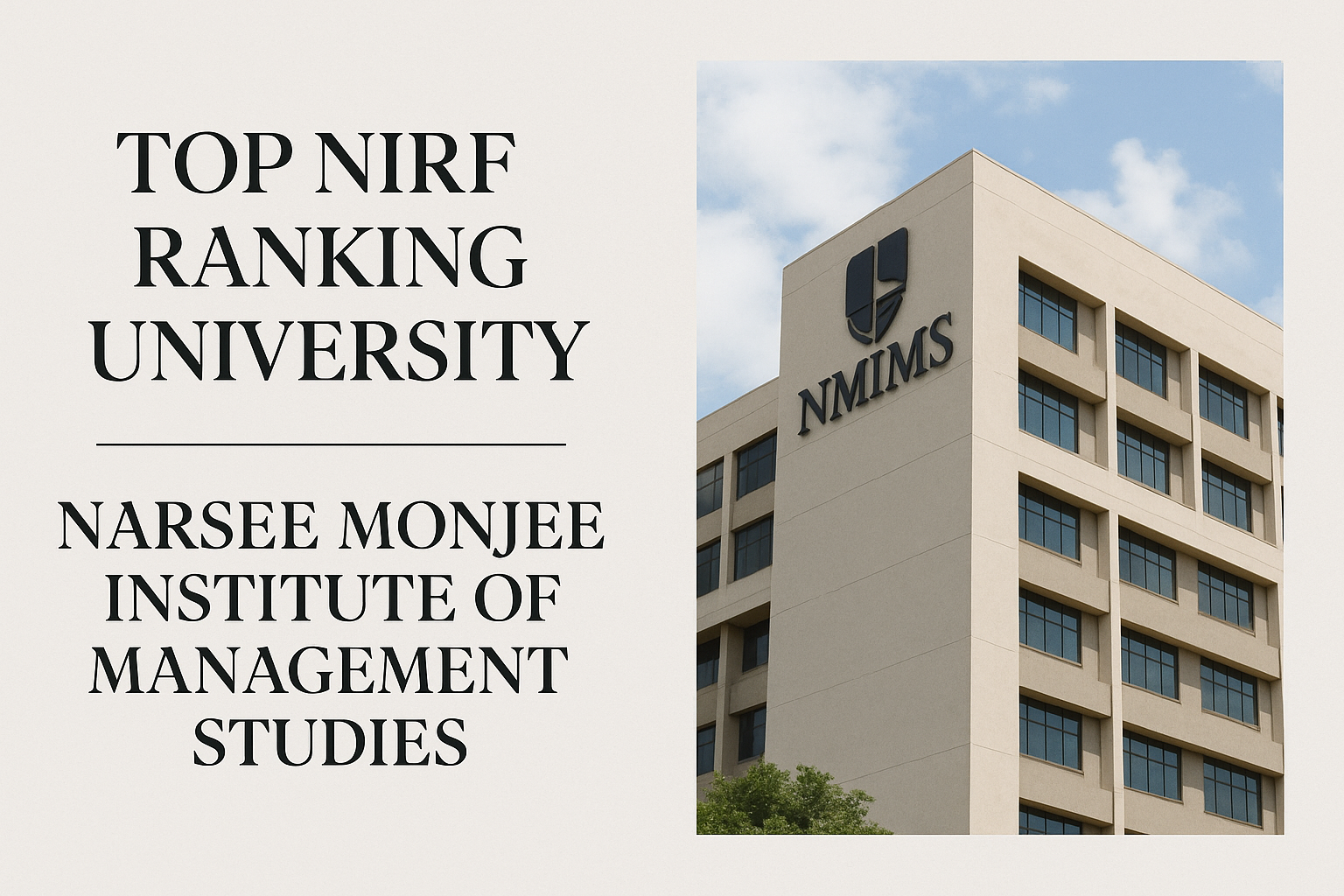
Top NIRF Ranking University – Narsee Monjee Institute of Management Studies (NMIMS)
When it comes to quality higher education in India, Online MBA Narsee Monjee Institute of Management Studies (NMIMS) consistently makes headlines. With over four decades of academic legacy, world-class infrastructure, industry-oriented programs, and an ever-expanding alumni base, NMIMS has become a name synonymous with innovation, employability, and academic excellence. The university’s continued recognition in the National Institutional Ranking Framework (NIRF) by the Government of India is proof of its commitment to delivering high-impact education. But what exactly makes NMIMS Online MBA one of the top NIRF-ranked universities in India? In this blog, we break down the reasons behind NMIMS’s impressive NIRF rankings, explore its courses, placement statistics, global exposure, and explain why students across India aspire to be a part of this prestigious institution. 🏆 NMIMS at a Glance Full Name: Narsee Monjee Institute of Management Studies Established: 1981 Type: Deemed-to-be University NAAC Accreditation: A+ Grade NIRF Rank (2024 – Management): Ranked among the Top 10 private B-Schools in India Campuses: Mumbai (Main), Shirpur, Bengaluru, Hyderabad, Indore, Navi Mumbai, Dhule, Chandigarh Approved by: UGC, AICTE, NBA Mode of Education: Full-time, Distance, and Online 📊 NMIMS in NIRF Rankings The National Institutional Ranking Framework (NIRF), launched by the Ministry of Education, evaluates higher education institutions in India across key parameters like: Teaching, Learning & Resources Research and Professional Practice Graduation Outcomes Outreach and Inclusivity Perception NMIMS 2024 NIRF Rankings (Key Highlights): Category NIRF Rank (2024) Management Top 10 Private Pharmacy Top 5 in India University Overall Top 50 Online MBA NMIMS consistently ranks above many public institutions in categories like Management, Pharmacy, and Engineering, showcasing its robust academic and research culture. 🏫 NMIMS Campuses Across India What makes NMIMS unique is its multi-campus model, offering consistent quality education across various disciplines. NMIMS Mumbai (Flagship Campus) Known for MBA, Engineering, Law, and Design Located in Vile Parle, heart of Mumbai Offers top-tier placements and global collaborations NMIMS Bangalore MBA and Executive programs Known for entrepreneurship and startup incubation State-of-the-art infrastructure NMIMS Hyderabad & Indore Emerging hubs for Business, Tech, and Commerce education Focus on research-driven learning NMIMS Shirpur & Navi Mumbai Engineering, Pharmacy, Agriculture, and Management programs Extensive hostel and residential facilities 🎓 Popular Courses Offered by NMIMS NMIMS Online MBA offers undergraduate, postgraduate, doctoral, diploma, and online programs in over 17 disciplines. Here are some of the top-ranked and high-demand courses: MBA (Master of Business Administration) Flagship 2-year full-time program Specializations: Finance, Marketing, HR, Operations, Analytics Admission via NMAT by GMAC B.Pharm + MBA (Pharma Tech) Integrated 5-year program Among top 5 in India (Pharmacy NIRF ranking) B.Tech + MBA (Tech Management) Tech + Management hybrid degree Fast-track leadership roles in tech firms BA LLB / BBA LLB Law courses approved by the Bar Council of India Known for moot court exposure and internships BBA, B.Com (Hons), B.Sc. (Finance) Strong placements and business exposure Early grooming for corporate leadership Online & Distance MBA Offered through NMIMS Global UGC-entitled, AICTE-approved, highly flexible for working professionals 💼 NMIMS Placement Overview Placements at NMIMS are one of the top reasons behind its growing popularity and NIRF rankings. MBA Placement Highlights (2024): Metric Value Average Package ₹19.5 LPA Highest Package ₹67.8 LPA (International) PPOs Offered 120+ Domains Consulting, BFSI, FMCG, IT, E-commerce 💡 The focus on industry immersion and live projects helps students become job-ready from day one. 🌍 Global Collaborations NMIMS has forged partnerships with leading global universities and institutions to promote student exchange, research collaborations, and dual degree programs. Get a free counseling session for Online MBA Degree NMIMS University Enquiry Now Top International Partners: University of South Florida University of Bristol Grenoble Ecole de Management, France IESEG School of Management University of Canberra, Australia Students benefit from global immersion programs, international faculty, and multicultural exposure, boosting their global employability. 🧑🏫 Faculty & Research Excellence NMIMS boasts of a strong faculty pool with PhDs, industry experience, and international research credentials. Several centers of excellence work on cutting-edge research in: Analytics & Data Science Financial Markets Artificial Intelligence Healthcare Innovation Legal Research & Public Policy NMIMS publishes in reputed journals, engages in funded projects, and encourages student-led research initiatives, making it research-intensive and academically enriching. 🧾 Admission Process at NMIMS Undergraduate Programs: Through NPAT (NMIMS Programs After Twelfth) Subjects: BBA, B.Com, B.Sc. Finance, Law, Design Postgraduate (MBA): Admission via NMAT by GMAC Followed by Case Discussion and Personal Interview Doctoral & Research: Written test + Research Proposal Presentation All admissions are based on merit, aptitude, and academic consistency. 📲 NMIMS and Digital Education NMIMS was among the first private universities in India to embrace online learning at scale. Key Digital Initiatives: NMIMS Global Access (NGASCE) for Online MBA Virtual labs, webinars, and LMS for continuous learning AI-driven analytics to track student progress NMIMS Online MBA alone has over 1.25 lakh learners, making it a market leader in online management education. 🔁 Why NMIMS is Consistently Ranked in NIRF ✅ Academic Excellence Curriculum co-developed with industry and global standards. ✅ Strong Industry Connect Regular workshops, mentorships, and internship opportunities. ✅ Research-Oriented Environment Grants, publications, innovation centers, and entrepreneurship cells. ✅ Holistic Student Development Events, clubs, fests, leadership summits, and sports. ✅ National & Global Recognition NIRF rankings, NAAC A+ status, and QS I-GAUGE certifications. ❓FAQs: NMIMS & NIRF Ranking Q1. Is NMIMS a NIRF-ranked university? Yes. NMIMS ranks among the top private universities in India across Management, Pharmacy, and University categories. Q2. Is NMIMS better than IIMs? While IIMs are public institutions with legacy value, NMIMS offers strong placements, global exposure, and industry-relevant programs, making it a top private alternative. Q3. Is NMIMS online MBA recognized by NIRF? NIRF doesn’t rank online programs specifically, but NMIMS’s core management faculty and academic strength contribute to its overall high rank. Q4. Does NMIMS offer good placements? Yes. MBA students from NMIMS receive high-paying job offers, with the average salary exceeding ₹19 LPA in 2024. Q5. Is NMIMS good for undergraduate programs? Absolutely. NMIMS is one of

Online MBA Degree in India from NMIMS University
In today’s dynamic business world, an MBA isn’t just a degree – it’s a powerful career accelerator. But not everyone has the time or flexibility to enroll in a traditional, full-time MBA program. That’s where NMIMS University Online MBA Degree steps in. NMIMS (Narsee Monjee Institute of Management Studies) is one of India’s top private universities and a pioneer in delivering high-quality online education through its arm – NMIMS Global Access School for Continuing Education (NGASCE). Designed specifically for working professionals, the NMIMS Online MBA combines academic excellence with real-world relevance, and yes – it’s UGC-entitled, NAAC A+ accredited, and highly industry-focused. Let’s dive into everything you need to know about pursuing an Online MBA from NMIMS University in 2025 – including course structure, eligibility, fees, specializations, career scope, and FAQs. 🎓 About NMIMS Global Online MBA Established in 1981, NMIMS has evolved into one of India’s most prestigious B-schools. The university launched its online division, NMIMS Global, to cater to the growing demand for flexible, career-oriented learning. The Online MBA (Distance+Online Mode) offered by NMIMS Global is one of the most sought-after programs by working professionals, entrepreneurs, and even fresh graduates. Why NMIMS Online MBA? UGC-Entitled & AICTE-Approved NAAC Grade A+ Accredited University Ranked among Top 10 Private B-Schools in India Over 1.25 lakh active students globally Corporate tie-ups and placement support 📘 Program Overview Feature Details Program Name MBA (Distance + Online Mode) University NMIMS Global (NGASCE) Duration 2 Years (flexible up to 4 years) Mode of Delivery Online + Recorded + E-Learning Specializations 10+ Options Eligibility Graduation with 50% marks Accreditation UGC, AICTE, NAAC A+ Fee Structure ₹1.68 Lakhs approx (2025 rates) Admission Rounds January and July intakes 📚 Online MBA Specializations Offered NMIMS Global offers over 10 in-demand MBA specializations tailored for today’s evolving job market: Finance Human Resource Management Marketing Operations Management Business Analytics International Trade Management Supply Chain Management Information Technology & Systems Management Banking and Financial Services Retail Management🎯 Pro Tip: Choose a specialization based on your current job or desired career pivot. 💡 Key Features of NMIMS Online MBA 1. Flexible Learning Format Access recorded lectures, live webinars, and digital libraries from anywhere in the world. Perfect for working professionals. 2. Weekly Live Sessions Interactive sessions with faculty help bridge the gap between distance and classroom education. 3. Dedicated Student Portal (LMS) Get assignments, video lectures, e-books, and doubt-clearing sessions—all in one place. 4. Industry-Relevant Curriculum The course is designed by seasoned industry experts and NMIMS faculty to keep up with real-world business demands. 5. Career Assistance NMIMS Global offers resume writing, interview prep, and access to job portals and placement fairs. 💸 NMIMS Online MBA Fee Structure (2025) You can pay the fee in lump sum, annually, or semester-wise. Payment Mode Total Fee (Approx.) One-time Payment ₹1,68,000 Annual Mode ₹91,000/year Semester Mode ₹48,000/semester Note: GST and registration charges are extra. Scholarships and EMI options available. ✅ Eligibility Criteria You need to meet the following criteria to be eligible for admission: A Bachelor’s Degree (10+2+3) from a recognized university. Minimum 50% aggregate marks (in any stream). No entrance exam required. Work experience (optional) but advantageous. 📅 Admission Process The NMIMS Online MBA admission process is simple and fully online: 1. Apply Online: Fill out the application form on NMIMS Global’s official website. 2. Upload Documents: Academic records, ID proof, and a photograph. 3. Pay Application Fee: ₹1,200 (non-refundable). 4. Telephonic Counselling: Some applicants may be contacted for profiling. Get Enrolled: After document verification and fee payment. 👨💼 Career Scope After NMIMS Online MBA NMIMS has a strong industry reputation, and its online MBA carries significant weight in the job market, especially in India and the Middle East. Get a free counseling session for Online MBA Degree NMIMS University Enquiry Now Top Roles for NMIMS Online MBA Graduates: Role Average Salary (INR/Year) Marketing Manager ₹7–12 LPA Financial Analyst ₹6–10 LPA HR Manager ₹6–9 LPA Operations Manager ₹7–11 LPA Business Analyst ₹8–14 LPA Product Manager ₹10–18 LPA Hiring Companies: Accenture Infosys HDFC Bank Deloitte Amazon KPMG Reliance Industries Cognizant 📊 NMIMS Online MBA vs Regular MBA Parameter NMIMS Online MBA Regular MBA Mode Online + Recorded On-Campus Flexibility High Fixed Schedule Fee ₹1.6 – ₹1.8 Lakhs ₹6 – ₹25 Lakhs Work While Studying Yes Mostly No Recognition UGC + AICTE UGC + AICTE ROI High for Working Pros Depends on B-School Conclusion: The NMIMS Online MBA is perfect for those looking to upskill without quitting their jobs or spending a fortune. 🙋♀️ Frequently Asked Questions (FAQs) Q1. Is NMIMS Online MBA degree valid? Yes, NMIMS Online MBA is UGC-Entitled and AICTE-approved, making it fully valid for jobs, promotions, and government exams. Q2. Does NMIMS Online MBA offer placement support? Yes, NMIMS Global offers career assistance services, including resume building, mock interviews, and access to partner job portals. Q3. Is NMIMS Online MBA tough? The course is rigorous but manageable, especially for working professionals. With consistent study and interaction in live sessions, success is achievable. Q4. Can freshers apply for NMIMS Online MBA? Yes, freshers can apply, but the program is best suited for professionals with at least 1–2 years of work experience. Q5. Is NMIMS Online MBA worth the money? Absolutely. Given the academic quality, brand value, flexibility, and industry alignment, it offers great value for its cost. 🏁 Final Thoughts An Online MBA from NMIMS University isn’t just a qualification – it’s a strategic step toward career transformation. With its flexible format, globally respected brand, and career-focused curriculum, it’s ideal for ambitious professionals who want to grow without pressing pause on their careers. Whether you’re aiming for a promotion, a career pivot, or your first managerial role – NMIMS Global can help you get there, affordably and effectively. Inquiry FormPlease enable JavaScript in your browser to complete this form.Please enable JavaScript in your browser to complete this form.Name *Email *Mobile Number *Enter Your CitySelect Course *-Select Course-B.ScBABCAB.ComBBAMCAM.ScM.ComMBAMA Submit Top Universities Admission Open for 2025

Affordable Online MBA in India
In a world where upskilling has become more than just a trend, an MBA degree is still one of the most powerful tools to climb the professional ladder. However, with rising tuition costs, the dream of earning an MBA often gets sidelined. That’s where affordable online MBA programs in India come to the rescue. Thanks to UGC-approved online learning models, several Indian universities now offer MBA degrees at a fraction of the cost, without compromising on quality or recognition. These programs are not only pocket-friendly but also flexible and career-focused, making them ideal for working professionals and fresh graduates alike. In this guide, we’ll explore everything you need to know about pursuing an affordable online MBA in India in 2025 — including top universities, course fees, eligibility, career prospects, and FAQs. 🎓 Why Choose an Online MBA in India? Online MBAs are gaining massive popularity for good reason: 📍 Affordability: Tuition fees are significantly lower than full-time MBAs. 💻 Flexibility: Learn at your own pace from anywhere in India or abroad. 🏢 Work-Life Balance: Continue working while earning your degree. ✅ UGC-DEB Recognition: Degrees are valid and respected across sectors. 🔍 Industry-Relevant Curriculum: Learn trending skills like AI, digital marketing, business analytics, and more. 🏆 Top 7 Affordable Online MBA Programs in India Here’s a curated list of the most affordable UGC-approved online MBA universities in India as of 2025: University Approximate Fee Duration Specializations Recognition GNOU (Indira Gandhi National Open University) ₹37,800 2.5 – 8 Years HR, Finance, Ops, Marketing UGC + AICTE Jain University (Online) ₹1.20 Lakhs 2 Years 20+ including Data Science, Finance, HR UGC + NAAC A++ DY Patil University Online ₹1.30 Lakhs 2 Years Hospital Management, IT, International Business UGC + NAAC A++ Amity University Online ₹1.79 Lakhs 2 Years HR, Marketing, Finance, Entrepreneurship UGC + NAAC A+ Manipal University Jaipur Online ₹1.50 Lakhs 2 Years Finance, HRM, IT, Marketing, Analytics UGC + NAAC A+ UPES Online MBA ₹1.50 Lakhs Oil & Gas, Energy, Marketing, HR 2 Years UGC + Industry Partnership Symbiosis Centre for Distance Learning (SCDL) ₹50,000 2 Years Marketing, Finance, Ops, HR AICTE (Distance Mode) 💡 Pro Tip: Always check if the university is UGC-DEB approved before enrolling. 🧑🎓 IGNOU: India’s Most Affordable Online MBA IGNOU has long been known for offering quality education at unbeatable prices. Its online MBA is no different. Total Fee: ₹37,800 Eligibility: Bachelor’s Degree with 50% (General) / 45% (Reserved) Specializations: HRM, Financial Management, Marketing, Operations Recognition: AICTE + UGC Entrance Exam: OPENMAT (May be exempted) Pros: Unbeatable pricing Pan-India recognition Flexible duration Cons: Less interactive No dedicated placement cell 📚 What Makes an Online MBA Affordable? Not all low-cost MBAs are worth your time. Look for: UGC-DEB Approval: Ensures validity for jobs and further education. NAAC Accreditation: A or A++ rated universities offer better academic support. Recorded + Live Lectures: Ideal for flexible learning. Career Services: Resume building, mock interviews, and job fairs. Specialization Options: Choose future-forward skills like Business Analytics, FinTech, and Digital Marketing. 📝 Eligibility Criteria for Online MBA in India Here’s what you generally need to enroll in an affordable online MBA: A Bachelor’s degree in any stream (minimum 50% preferred) Some universities may require work experience for executive programs No entrance exam for most online MBAs (except IGNOU in some cases) A stable internet connection and basic digital skills Get a free counseling session for Online MBA Degree NMIMS University Enquiry Now 📈 Career Opportunities After Online MBA Online MBA graduates are well-positioned for various roles across sectors. If you’re already working, the degree helps boost your career prospects. If you’re a fresher, it adds weight to your resume. Popular Job Roles: Role Average Salary (INR/Year) Marketing Manager ₹6–10 LPA Business Analyst ₹7–12 LPA HR Manager ₹5–8 LPA Operations Manager r ₹6–11 LPA Financial Analyst ₹5–9 LPA Product Manager ₹10–20 LPA 🔎 With 2–3 years of experience, online MBA grads can command salaries on par with regular MBAs. 🔍 How to Choose the Best Affordable Online MBA Not sure how to pick the right one? Ask yourself: ✅ Is the university UGC-DEB approved? Check the official list here. ✅ What is the total fee including hidden costs? Ask for breakdowns: tuition, registration, exam, and tech fees. ✅ What specializations are offered? Choose in-demand streams like: Digital Marketing FinTech Business Analytics Healthcare Management Logistics & Supply Chain ✅ Does it offer placement support? Look for career coaching, resume reviews, virtual job fairs, etc. ✅ Are classes live, recorded, or both? Interactive sessions often offer better learning outcomes. 📊 Affordable vs. Expensive Online MBAs: Is It Worth Saving Money? Parameter Affordable MBA Expensive MBA Cost ₹40k – ₹1.5L ₹2L – ₹10L Recognition UGC/AICTE UGC/AICTE Curriculum Standard + Job-ready Often more specialized Faculty Qualified More international/industry veterans Placement Limited/Supportive Aggressive (varies) Verdict: Affordable MBAs are great for self-motivated learners with budget constraints or those who already have work experience. 📌 Top Benefits of Affordable Online MBA Programs ✔ Learn without quitting your job ✔ Skip commute and relocation costs ✔ Network with peers from across India ✔ Stay relevant in your current industry ✔ Access learning on mobile apps and LMS portals ✔ Learn job-ready skills affordably 🙋♂️ Frequently Asked Questions (FAQs) Q1. What is the cheapest online MBA in India? IGNOU offers the cheapest online MBA at just ₹37,800 for the complete program. Q2. Are online MBA degrees valid for jobs? Yes, if the program is UGC-DEB approved, it’s valid for government and private jobs. Q3. Can I get a job after an affordable online MBA? Yes. Many universities offer career services and placement assistance even for online learners. Q4. Which university offers the best value-for-money online MBA? Jain Online, DY

MBA Salary in India: Average Packages, Trends & Growth in 2025
An MBA (Master of Business Administration) continues to be one of the most sought-after postgraduate degrees in India. But let’s get to the heart of the matter—what is the MBA salary in India really like? Is it worth the investment? What can you expect as a fresher? Which specialization pays the most? In this blog, we break down MBA salary trends in India in 2025, covering average packages, highest-paying sectors, top colleges, and specialization-wise insights. Whether you’re a student planning to pursue an MBA or a working professional looking to upskill, this comprehensive guide will help you understand the return on investment (ROI) of an MBA in India. Category Average Annual Salary MBA Fresher ₹6–10 LPA Mid-level (3–5 years experience) ₹12–20 LPA Senior-level (8+ years) ₹25–40 LPA Premier B-Schools (IIMs, ISB, XLRI) ₹20–30 LPA (average) Tier-2 B-Schools ₹6–12 LPA Leadership and Influence ₹4–7 LPA 💡 Note: Salaries vary by sector, location, and specialization. 🧑🎓 Factors Influencing MBA Salaries in India MBA salaries are not uniform. They are influenced by several variables: ✅ Why Choose MBA Distance Learning? 1. Institution Reputation Graduates from IIMs, ISB, XLRI, FMS, and SPJIMR tend to land higher salary packages due to strong alumni networks and corporate partnerships. 2. Specialization Chosen Your MBA major plays a huge role. For example, MBA in Finance or Business Analytics often yields higher pay than HR or Operations, especially at the entry level. 3. Work Experience Freshers earn less compared to professionals with prior work experience. Executive MBA graduates with 5+ years of experience are often offered lucrative leadership roles. 4. Industry & Sector MBA grads in consulting, investment banking, product management, and tech earn significantly more than those in education, NGOs, or manufacturing. 5. Location Metro cities like Mumbai, Bangalore, Delhi, and Hyderabad offer higher salaries due to more job opportunities and multinational headquarters. 💼 MBA Specialization-Wise Salary in India (2025) 1. MBA in Finance Average Salary: ₹7–14 LPA Top Jobs: Investment Banker, Financial Analyst, Risk Manager, Corporate Finance Manager Top Employers: Goldman Sachs, Morgan Stanley, HDFC Bank, Deloitte, KPMG Finance continues to be one of the highest-paying MBA specializations, especially for roles in private equity and banking. 2. MBA in Marketing Average Salary: ₹6–12 LPA Top Jobs: Brand Manager, Digital Marketing Head, Sales Manager, Product Manager Top Employers: Hindustan Unilever, P&G, Amazon, Flipkart, Zomato If you’re creative and enjoy strategy and analytics, marketing roles pay well, especially in FMCG and e-commerce sectors. 3. MBA in Human Resource Management (HRM) Average Salary: ₹5–9 LPA Top Jobs: HR Manager, Talent Acquisition Specialist, HRBP Top Employers: Infosys, Accenture, TCS, Aditya Birla, ITC While HR doesn’t offer the highest pay initially, salaries increase significantly at leadership levels. 4. MBA in Business Analytics / Data Science Average Salary: ₹8–18 LPA Top Jobs: Business Analyst, Data Consultant, Product Analyst Top Employers: Google, PwC, Amazon, ZS Associates, MuSigma With the rise of AI and Big Data, Business Analytics is in huge demand, and pay packages reflect that. 5. MBA in Operations & Supply Chain Average Salary: ₹6–11 LPA Top Jobs: Operations Manager, Logistics Manager, Supply Chain Analyst Top Employers: Flipkart, Amazon, Mahindra, Maruti, DHL A solid choice for those inclined towards process optimization, logistics, and resource management. 6. MBA in Information Technology (IT) Average Salary: ₹8–14 LPA Top Jobs: IT Consultant, Project Manager, Systems Analyst Top Employers: Infosys, Wipro, Accenture, IBM, Tech Mahindra MBA in IT acts as a bridge between technical expertise and business strategy, especially in the product management domain. 🏫 Top MBA Colleges in India and Their Salary Packages (2025) Institute Average Package Highest Package IIM Ahmedabad ₹35 LPA ₹1.15 Cr (Intl) IIM Bangalore ₹34 LPA ₹88 LPA IIM Calcutta ₹33 LPA ₹90 LPA ISB Hyderabad ₹32 LPA ₹72 LPA XLRI Jamshedpur ₹32.7 LPA ₹78 LPA FMS Delhi ₹30 LPA ₹80 LPA SPJIMR Mumbai ₹28 LPA ₹72 LPA These B-schools have consistent placement records with top MNCs, consulting firms, and startups. 🌍 MBA Salary by Industry Industry Average Salary (LPA) Management Consulting ₹20–40 Investment Banking ₹18–35 Technology & Product ₹15–30 E-commerce ₹12–24 FMCG ₹10–18 Manufacturing ₹8–15 Education/EdTech ₹6–12 Healthcare/Pharma ₹7–14 Consulting and product management remain the most lucrative paths for MBA grads in India. 💸 MBA Salary for Freshers vs Experienced Professionals Experience Level Salary Range 0–1 Years ₹6–10 LPA 2–5 Years ₹10–20 LPA 6–10 Years ₹20–35 LPA 10+ Years (CXO roles) ₹40–80 LPA or more Your career growth accelerates sharply post-MBA, especially if you switch domains or move into leadership roles. 🔁 ROI of an MBA in India 📍Cost of MBA: Top-tier B-schools (IIMs, ISB): ₹20–30 Lakhs Tier-2 Private Institutes: ₹8–15 Lakhs Distance/Online MBAs: ₹1–3 Lakhs 📈ROI Calculation: A graduate from IIM Ahmedabad earning ₹30 LPA will recover the entire MBA fee within 1–2 years, whereas a tier-2 MBA grad may take 3–4 years depending on the initial salary. 📌 Tips to Maximize Your MBA Salary 1. Choose the right specialization aligned with market demand. 2. Gain work experience before applying—experience + MBA = better roles. 3. Intern smartly—internships often lead to PPOs (Pre-Placement Offers). 4. Build strong networks—connect with alumni, mentors, and faculty. 5. Focus on soft skills—leadership, communication, and teamwork are key. 🔮 Future Trends in MBA Salaries (2025–2030) AI & Tech Integration: More demand for MBAs who understand tech, analytics, and AI. Hybrid Job Roles: Product + marketing, HR + tech—interdisciplinary roles will boom. Remote MBA Hiring: Companies hiring top talent regardless of geography. Startup Ecosystem: Offering ESOPs + competitive salaries to MBA grads. ❓FAQs About MBA Salary in India Q1. What is the starting salary for an MBA graduate in India? The average starting salary for freshers is between ₹6–10 LPA, depending on college, specialization, and industry. Q2. Which MBA specialization gives the highest salary? Finance, Business Analytics, and Marketing are traditionally the highest-paying specializations. Q3. Do online or distance MBA graduates earn well? Yes, especially with relevant work experience. However, full-time MBA programs from top colleges tend to have higher average salaries. Q4. Can MBA

Free Online MBA Courses with Certificates
For decades, the MBA has been seen as the golden ticket to business leadership, corporate success, and entrepreneurial growth. But what if we told you that you could access MBA-level courses online—for free—and even get a certificate? That’s right! Thanks to the rise of e-learning and open education, you can now study business fundamentals from world-class institutions without paying lakhs of rupees. Whether you’re a budding entrepreneur, a working professional, or a curious learner—free online MBA courses with certificates are a smart way to upskill without breaking the bank. In this detailed guide, we’ll explore the best free MBA courses online, top platforms, how to get certified, and why this path is gaining serious momentum in 2025. 🎯 Why Consider Free Online MBA Courses? Before diving into the courses, let’s understand why this trend is exploding: ✅ Why Choose MBA Distance Learning? Here are the key advantages that make distance MBA programs increasingly popular in India: Zero Tuition Fees: Learn without financial stress. Certificate of Completion: Showcase your skills on LinkedIn or resumes. Flexible Schedule: Study at your own pace, anytime, anywhere. World-Class Content: Courses from Ivy League and top B-schools. Job-Relevant Skills: From leadership to finance, marketing to analytics. These courses may not give you a formal Online MBA Courses degree, but they offer real-world business knowledge and practical training. 🧑🎓 Who Should Take These Courses? Free online MBA courses with certificates are perfect for: Working professionals looking to boost career prospects. Entrepreneurs wanting to understand core business principles. Students preparing for management education. Career switchers aiming for roles in business or startups. Lifelong learners interested in leadership and management. 🌐 Top Platforms Offering Free Online MBA Courses with Certificates 1. Coursera Coursera partners with top universities like Yale, Wharton, and Stanford to offer MBA-level content. Best Courses: Financial Markets by Yale Strategic Management by Copenhagen Business School Marketing in a Digital World by University of Illinois Certificates: Free to audit courses; certificate available at a small fee. Financial aid options available. 2. edX edX offers top-tier courses from Harvard, MIT, and IIMB. Best Courses: The Science of Everyday Thinking (UQ) MicroMasters in MBA Core Curriculum (IIM Bangalore) – Free to audit Entrepreneurship in Emerging Economies (Harvard) Certificates: Pay for verified certificates; auditing is free. 3. LinkedIn Learning (Free for 30 Days) While not fully free, LinkedIn offers a one-month free trial where you can complete multiple business courses. Best Courses: Developing Executive Presence Business Strategy Fundamentals Excel for Business Analysts Certificates: Provided for all completed courses; highly shareable on LinkedIn. 4. Alison A 100% free learning platform with business management courses and free certificate options. Best Courses: Diploma in Business Management & Entrepreneurship Introduction to Time Management Risk Management in the Global Economy Certificates: Free digital certificates (PDF); printed ones at extra cost. 5. Saylor Academy An under-the-radar gem offering tuition-free courses at college level, including full business curriculum. Best Courses: Principles of Marketing Business Communication Managerial Accounting Certificates: Free certificate after passing a final exam. Get a free counseling session for Online MBA Degree NMIMS University Enquiry Now 📚 Recommended Free MBA-Level Courses (2025) Here’s a curated list of high-quality, free MBA courses worth your time: Course Title Provider Duration Certificate Financial Markets Yale (Coursera) 4 weeks Yes Business Foundations Wharton (Coursera) 6 weeks Yes Managerial Economics IIMB (edX) 6 weeks Yes Business Communication Saylor Academy Self-paced Yes Entrepreneurship 101 MIT (edX) 5 weeks Yes Leadership and Influence Alison 3 hours Yes Each course covers essential business skills like strategy, communication, finance, operations, and leadership. 🎓 Can You Build a “Mini MBA” for Free? Absolutely! By strategically combining a few free courses, you can create your own DIY MBA pathway. Here’s an example structure: 🧱 Core Business Modules: Finance & Accounting: Financial Markets (Yale), Accounting Principles (Saylor) Marketing: Digital Marketing (Illinois), Marketing Management (Alison) Operations: Operations Management (Wharton) Strategy: Strategic Management (CBS), Business Strategy (LinkedIn) Leadership: Emotional Intelligence (Yale), Leading Teams (edX) 🧩 Soft Skills: Communication, Negotiation, Time Management (via Alison/LinkedIn) At the end of 6–8 months, you’ll have completed 12–15 high-impact courses and earned certificates from globally respected platforms—for free or at very low cost. 📈 Career Benefits of Free MBA Courses While these courses don’t give you a formal MBA degree, they definitely enhance your career profile, especially when paired with experience. How It Helps: Upskill Quickly: Learn the latest tools and techniques. Certifications: Showcase verified credentials on LinkedIn/resume. Promotion-Ready: Managers often value skill over degree. Freelancers/Consultants: Boost credibility with clients. Startup Founders: Learn core business operations hands-on. Many hiring managers today value certifications, portfolios, and skills more than just degrees—especially in startups, remote jobs, and freelance ecosystems. ⚖️ Free MBA Courses vs Paid Online MBA Degrees Feature Free MBA Courses Paid Online MBA Cost Free or minimal ₹50,000 to ₹10 lakhs Degree No formal degree Yes Time Self-paced Structured (1–2 years) Flexibility Very high Moderate Recognition Depends on platform High (if accredited) Ideal For Skill learners Degree seekers Pro Tip: Start with free courses. If you enjoy the content and want a full credential, upgrade to a paid program later. 📋 How to Enroll in Free MBA Courses? Choose a Platform: Coursera, edX, Alison, etc. Create a Free Account Search for a Course: Use keywords like “MBA,” “Business Management,” “Leadership.” Audit the Course: Choose “Audit for free” or “Start for free.” Earn a Certificate: Complete the coursework and assessments. Download the certificate when done. 🧠 Tips to Maximize Your Learning Be Consistent: Set aside time weekly, like a real MBA class. Apply the Learning: Use case studies or real business problems. Join Discussion Forums: Interact with other learners. Highlight Certificates on LinkedIn: Don’t be shy about your achievements. Don’t Just Collect Certificates: Focus on actual understanding. ❓FAQs: Free Online MBA Courses with Certificates Q1. Are free online MBA courses legitimate? Yes, many are offered by top universities like Yale, Harvard, IIM, and Wharton on trusted platforms like Coursera and edX. Q2.

MBA Distance Learning in India
MBA Distance Learning In a fast-paced world where time and flexibility are more important than ever, pursuing an MBA through distance learning in India has become a smart, accessible, and career-defining choice for many. Whether you’re a working professional aiming to upskill, a homemaker looking to re-enter the workforce, or a recent graduate exploring higher education with flexibility— MBA Distance Programs open doors without locking you into a classroom. This blog explores everything you need to know about MBA distance learning in India—eligibility, top universities, fees, benefits, and more. 🌐 What is MBA Distance Learning? MBA Distance Learning is a postgraduate management program that allows students to complete their coursework remotely—through online classes, recorded lectures, study materials, and virtual exams. It is especially suitable for individuals who want to balance work, family, or other responsibilities while upgrading their qualifications. The degree holds value for career progression and, when pursued from UGC-DEB recognized institutions, is considered equivalent to a regular MBA by most employers. ✅ Why Choose MBA Distance Learning? Here are the key advantages that make distance MBA programs increasingly popular in India: 1. Flexibility: Learn at your own pace, without attending daily classes. 2. Affordability: Costs much less than regular MBAs, with no hostel or relocation expenses. 3. Accessibility: No geographical limitations—you can study from anywhere. 4. Career Growth: Helps working professionals get promotions or transition into managerial roles. 5. Diverse Specializations: Choose from Marketing, HR, Finance, IT, Operations, Data Analytics, etc. 🏛️ Top Distance MBA Universities in India (2025) Not all programs are created equal. Here are some UGC-DEB-approved and reputed universities offering high-quality distance MBA programs in India: 1. Indira Gandhi National Open University (IGNOU) Course: MBA (Distance Mode)Duration: 2–5 yearsEligibility: Graduation with 50% (45% for reserved categories)Fees: ₹62,000 approx.Highlights: Most popular public option; flexible study schedule 2. Symbiosis Centre for Distance Learning (SCDL) Course: PGDBA (Equivalent to MBA) Duration: 2 years Eligibility: Graduate in any discipline Fees: ₹60,000 approx. Highlights: Industry-aligned curriculum; reputed private institute 3. NMIMS Global Access School for Continuing Education Course: MBA (Distance/Online) Duration: 2 years Eligibility: Bachelor’s degree + work experience preferred Fees: ₹1.5 to ₹2 lakhs Highlights: AI-powered learning platform; corporate-oriented 4. Amity University Online Course: MBA (Distance/Online) Duration: 2 years Fees: ₹1.2 to ₹1.8 lakhs Highlights: Accredited by WES (Canada/US); global recognition 5. ICFAI University Course: MBA (Distance Education) Duration: 2 years Fees: ₹65,000 approx. Highlights: Modular exam system; case-study approach 📋 Eligibility Criteria While the exact requirements differ by university, here’s the standard eligibility for MBA distance learning in India: . Bachelor’s Degree from a recognized university (any discipline). Minimum Marks: Usually 50% aggregate (relaxation for SC/ST/OBC in some cases). Entrance Exam: Not always required; some universities conduct their own tests or grant direct admission Note: Work experience is often preferred but not mandatory for most programs. 💰 MBA Distance Learning Fees in India The fee structure for distance MBA programs is significantly lower than full-time MBAs. Here’s a general breakdown: Type of University Average Fees (2 Years) Public Universities ₹30,000 – ₹70,000 Private Universities ₹60,000 – ₹2,00,000 Additional costs may include registration, exam fees, or study materials. 📚 Popular MBA Specializations in Distance Mode Here are some in-demand specializations you can pursue through distance MBA: Marketing Management Human Resource Management Finance Operations Information Technology Business Analytics International Business Retail Management Supply Chain Management Choose a specialization based on your career goals and industry trends. 💼 Career Scope After MBA Distance Learning Wondering if a distance MBA can land you a great job? Absolutely—especially if you back it with experience and skills. Job Roles After Distance MBA: Marketing Manager HR Manager Financial Analyst Project Manager Operations Head Business Consultant Product Manager Data Analyst Average Salary: Entry Level: ₹3–6 LPA Mid-Level: ₹6–12 LPA Senior Roles: ₹12+ LPA Many professionals pursue a distance MBA while continuing their job and receive promotions or switch careers upon graduation. Get a free counseling session for Online MBA Degree NMIMS University Enquiry Now 🆚 Regular MBA vs Distance MBA Feature Regular MBA Distance MBA Cost High (₹8–20 Lakh) Low (₹30k–₹2 Lakh) Mode of Study Full-time, On-campus Online/Offline combo Flexibility Rigid Very Flexible Networking High (on-campus) Moderate (online) Recognition High (top institutes) Good (UGC-DEB approved) Ideal For Fresh Graduates Working Professionals 📅 Admission Process for Distance MBA Most universities follow this standard application process: Apply Online via university portal Upload Documents (Graduation certificate, ID proof, photo, etc.) Entrance Exam (if required) Get Admission Confirmation Start Classes (online platform access provided) Pro Tip: Always verify the university’s UGC-DEB recognition before enrolling. 🛑 Things to Keep in Mind Before Choosing a Program Accreditation: Check UGC-DEB, AICTE approvals Mode of Delivery: Live classes or self-paced? Placement Support: Alumni network or career assistance Curriculum Quality: Industry-relevant or outdated? Student Reviews: Look for honest feedback online 💰 Average Course Fee Absolutely. In today’s hybrid work environment and skill-driven economy, distance MBAs are highly respected—especially if pursued from a recognized institution. They allow professionals to grow without quitting their jobs, offer flexibility, and come at a fraction of the cost of regular MBAs. However, the key lies in self-discipline, choosing the right specialization, and applying your learning in real-world scenarios. ❓FAQs: MBA Distance Learning in India Q1. Is distance MBA valid in India? Yes, as long as it’s from a UGC-DEB recognized university. It is valid for jobs and government exams. Q2. Can I get a job after a distance MBA? Absolutely. Many professionals secure promotions or shift to new roles after completing a distance MBA. Q3. Does a distance MBA have entrance exams? Some universities do conduct entrance exams, but many offer direct admissions based on graduation marks. Q4. What is the average salary after a distance MBA? Salary ranges from ₹3–12 LPA depending on experience, specialization, and the employer. Q5. Which is the best university for distance MBA in India? IGNOU, NMIMS, Symbiosis, Amity, and ICFAI

Top Diploma Courses After 12th – Stream-Wise Breakdown
After completing 12th grade, many students look for career-oriented programs that offer practical skills and faster entry into the workforce. Diploma courses are a great option, providing focused training in a variety of fields. Some of the top diploma courses after 12th include Diploma in Engineering, which is ideal for students interested in technical fields; Diploma in Hotel Management, which opens doors to the hospitality industry; and Diploma in Graphic Design, perfect for creatively inclined individuals. Other popular options include Diplomas in Nursing, Fashion Designing, Computer Applications, and Digital Marketing. These courses typically range from 6 months to 3 years and are available for both science and commerce students, helping them build strong foundations for successful careers or further studies Diploma Courses After 12th Science Perfect for those who took Physics, Chemistry, Biology or Mathematics: Diploma in Medical Lab Technology (DMLT) 1. Duration: 2 years 2. Careers: Lab Technician, Pathologist Assistant 3. Avg Salary: ₹15,000–₹30,000/month High demand in hospitals and diagnostic centersDiploma in Radiology / X-Ray Technology 1. Duration: 2 years 2. Careers: Radiology Technician High demand in hospitals and diagnostic centers Diploma in Engineering (Polytechnic)1. Specializations: Mechanical, Civil, Electrical, Electronics2. Duration: 3 yearsEntry-level job roles in core industries Diploma in Nutrition & Dietetics1. Duration: 1–2 yearsGreat option for biology students with an interest in health & wellness Diploma in Pharmacy (D.Pharm) 1. Duration: 2 yearsYou can work as a pharmacist or open your own chemist shop Diploma in Nursing / General Nursing and Midwifery (GNM)1. Duration: 3 yearsIn-demand across private and government hospitals 📘 Diploma Courses After 12th Commerce If you had Accounts, Business Studies, or Economics: Diploma in Financial Accounting 1. Duration: 1 year 2. Learn Tally, GST, Taxation, and Excel 3. Good for entry-level finance jobs Diploma in Banking & Finance 1. Duration: 1 year 2. Prepare for private sector banking jobs and NBFC roles Diploma in Digital Marketing 1. Duration: 6 months – 1 year High-demand skills in SEO, social media, and content marketing Diploma in Business Management 1. Duration: 1–2 years Foundation course for MBA or entrepreneurship Diploma in E-Commerce 1. Duration: 6–12 months Learn how online stores function (great for aspiring entrepreneurs) Get a free counseling session for Online MBA Degree NMIMS University Enquiry Now 📕 Diploma Courses After 12th Arts Ideal for students who had History, Political Science, English, Sociology, etc.: Diploma in Journalism & Mass Communication Duration: 1–2 years Careers: Reporter, Content Writer, Anchor, PR Executive Diploma in Event Management Duration: 1 year Learn how to plan weddings, concerts, and corporate events Diploma in Travel & Tourism Duration: 1–2 years Work in travel agencies, airlines, or start a travel vlog Diploma in Graphic Design Duration: 6 months – 1 year Skills: Photoshop, Illustrator, Canva Careers: Designer, UI/UX assistant, Social Media Creator Diploma in Foreign Languages (French, German, Japanese) Duration: 1 year Great career in embassies, MNCs, tourism, or interpretation 🧑💼 Job-Oriented Diploma Courses for All Streams These are open to students from any background: Diploma in Hotel Management Diploma in Animation & Multimedia Diploma in Fashion Designing Diploma in Photography Diploma in Computer Applications (DCA) Diploma in Web Design & Development 📊 Quick Comparison Table Course Duration Suitable For Job Scope DMLT 2 years Science Hospitals, labs Digital Marketing 6–12 months All streams Agencies, startups Banking & Finance 1 year Commerce NBFCs, banks Mass Communication 1–2 years Arts Media houses, PR firms Computer Applications 1 year All IT companies, govt jobs 🎯 How to Choose the Right Diploma Course Ask yourself: What are my interests and strengths? Do I want to work soon or study further later? What’s the industry demand for the skill? What’s my budget and time availability? 💡 Tip: Shortlist 2–3 courses, check their curriculum, and consult career counselors or alumni. 🏫 Top Institutes Offering Diploma Courses NSDC (National Skill Development Corporation) IGNOU Polytechnic Colleges (State/Private) Indian Institute of Mass Communication (IIMC) Amity University / Symbiosis / Lovely Professional University (LPU) Also explore online platforms like Coursera, UpGrad, Skill India, etc., for flexible learning. 💰 Average Course Fee Government colleges: ₹10,000 – ₹50,000/year Private institutes: ₹30,000–₹150,000/year Online: ₹5,000 – ₹50,000 (varies) 💡 FAQs About Diploma Courses After 12th ❓Q1. Which is the best diploma course after 12th? A: Depends on your interest. DMLT, Digital Marketing, and Graphic Design are currently trending across different streams. ❓Q2. Can I get a job after a diploma course? A: Yes. Many diploma courses are job-oriented and offer entry-level positions in IT, media, finance, and healthcare sectors. ❓Q3. Is a diploma better than a degree? A: A diploma is shorter and practical, great for early career entry. But for higher posts, a degree may be required later. ❓Q4. Are diploma courses available online? Typically, it takes 5–7 years of education and experience — including undergraduate studies, internships, and possibly a master’s degree or certifications. ❓Q5. Can I pursue a diploma and a degree together? A: Yes, if done through distance learning or online mode, it’s possible alongside a regular degree. ✅ Conclusion If you’re looking for quick, practical, and job-ready education after 12th, diploma courses are your best bet. Whether your goal is to start earning, gain skills, or explore an industry, there’s a course that fits your journey. Still confused? Let your passion guide you—and start small. Remember, even the biggest careers start with a smart step. Inquiry FormPlease enable JavaScript in your browser to complete this form.Please enable JavaScript in your browser to complete this form.Name *Email *Mobile Number *Enter Your CitySelect Course *-Select Course-B.ScBABCAB.ComBBAMCAM.ScM.ComMBAMA Submit Top Universities Recent News Big B’s Granddaughter Navya gets admission to IIM Ahmedabad; Know all about BPGP eligibility, Fees CDS 2 Answer Key 2024 (OUT) Live Updates: Download Answer Key PDFs for English, GK, Maths Set A, B, C and D Big B’s Granddaughter Navya gets admission to IIM Ahmedabad; Know all about BPGP eligibility, Fees CDS 2 Answer Key 2024 (OUT) Live Updates: Download Answer Key PDFs for
[contact-form-7 id="3b9b35a" title="Appointment Form_copy_copy"]

















